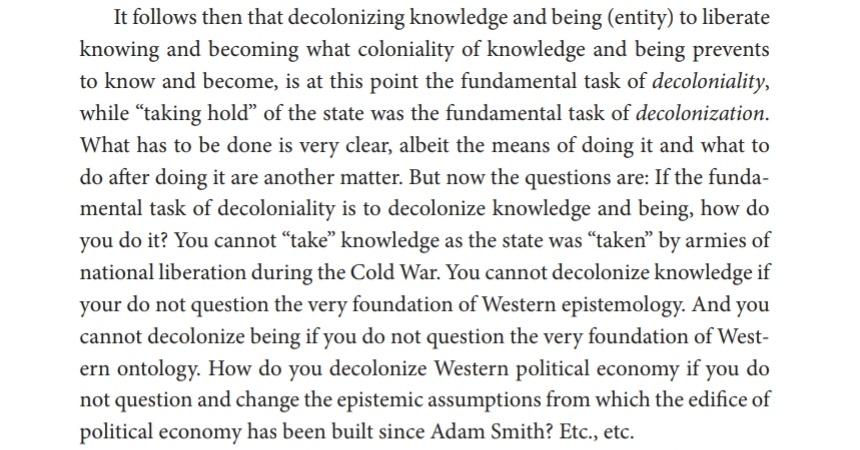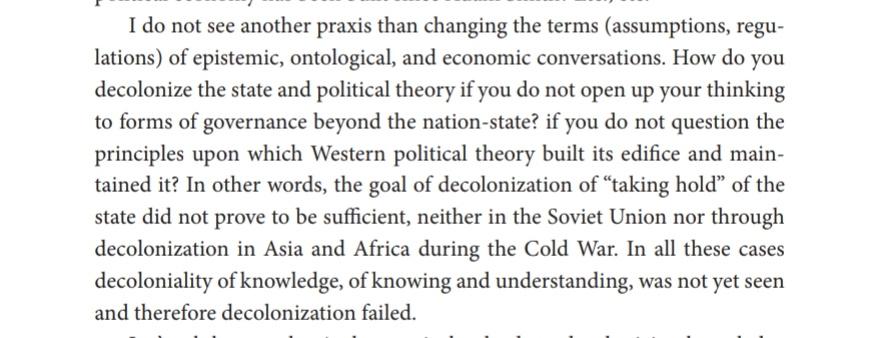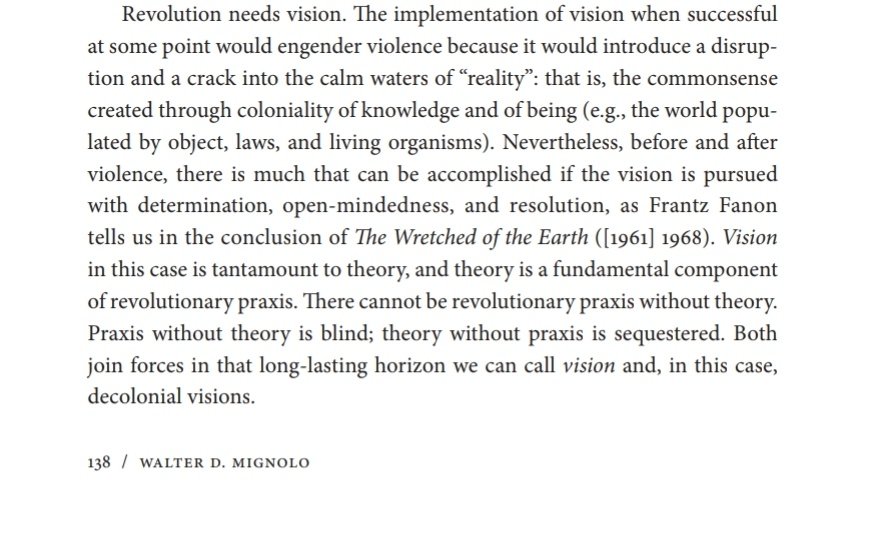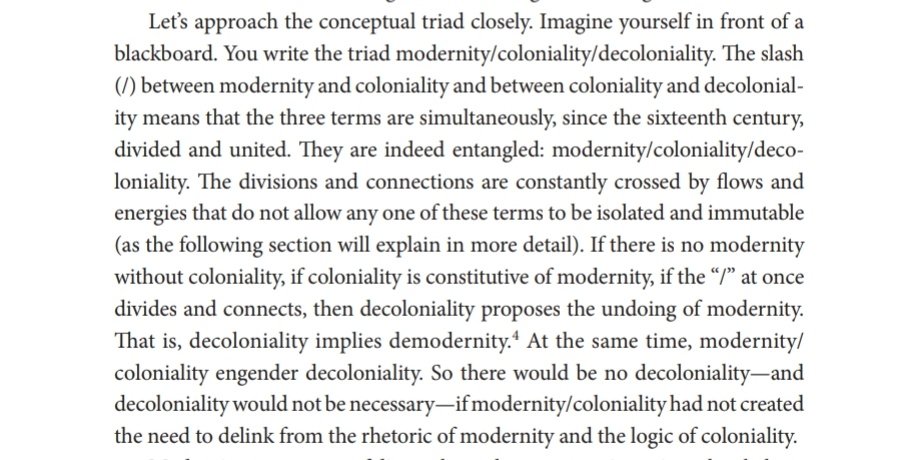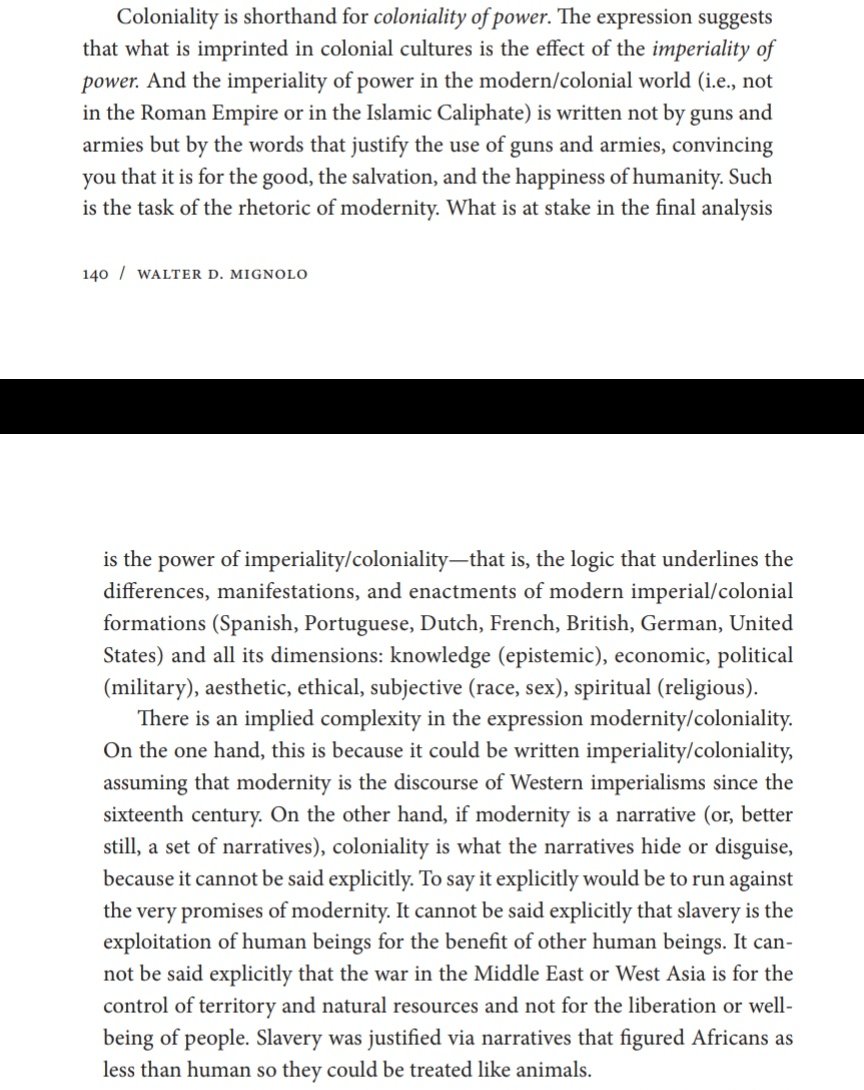On Decoloniality, won the votes so here:
"The proposition here and in the series is to advance the undoing of Eurocentrism’s totalizing claim and frame, including the Eurocentric legacies incarnated in U.S.-centrism and perpetuated in the Western geopolitics of knowledge."
"The proposition here and in the series is to advance the undoing of Eurocentrism’s totalizing claim and frame, including the Eurocentric legacies incarnated in U.S.-centrism and perpetuated in the Western geopolitics of knowledge."
"Vincularidad is the awareness of the integral relation and interdependence amongst all living organisms ... vincularidad/relationality unsettles the singular authoritativeness and universal character typically assumed and portrayed in academic thought."
"the pluriversal opens rather than closes the geographies and spheres of decolonial thinking and doing. It opens up coexisting temporalities kept hostage by the Western idea of time and the belief that there is one single temporality: Western imagined fictional temporality"
"Such perspective does not mean a rejection or negation of Western thought; in fact, Western thought is part of the pluriversal ... Our thinking instead is with the decolonial critiques of Eurocentrism that have been present in diferent moments in time"
"Coloniality is constitutive, not derivative, of modernity. That is to say, there is no modernity without coloniality, thus the compound expression: modernity/coloniality ... Decolonially speaking, modernity/coloniality are intimately .. explicitly, and complicitly entwined"
"Decoloniality, as we argue in this book, is not a new paradigm or mode of critical thought. It is a way, option, standpoint, analytic, project, practice, and praxis"
"this volume delinks from the modern concept of theory vs praxis. For us, theory is doing and doing is thinking. Are you not doing something when you theorize or analyze concepts? Isn’t doing something praxis? & from praxis - do we not also construct theory and theorize thought?"
"When enough houses are built, the hegemony of the master’s house—in fact, mastery itself—will cease to maintain its imperial status. Shelter needn’t be the rooms offered by such domination."
"herstories, transtories, and ourstories of thought have been made invisible by the racism and heteropatriarchy of the modern/colonial order. The genealogies of decolonial thinking and doing .. have always marched parallel to the global predatory advance of modernity/coloniality"
"decoloniality has been a component part of (trans)local struggles, movements, and actions to resist and refuse the legacies and ongoing relations and patterns of power established by external and internal colonialism - and the global designs of the modern/colonial world."
"Decoloniality .. is not a static condition ... Instead, decoloniality seeks to make visible, open up, and advance radically distinct perspectives and positionalities that displace Western rationality as the only framework and possibility of existence, analysis, and thought"
"Decoloniality, without a doubt, is also contextual, relational, practice based, and lived. In addition, it is intellectually, spiritually, emotionally, and existentially entangled and interwoven ... "without praxis ... no pathway is made". It is praxis that makes the path"
[Decoloniality] "is not to write about, nor is it to develop a narrative by simply citing a plethora of authors ... Rather, it is to think from and with standpoints, struggles, and practices ... it is to think from and with struggles that think and thought that struggles"
"Thought that does not struggle is nothing more than noise, and struggles that do not think, repeat the same errors and do not get up after falling" - say the Zapatistas
"I am referring to a thinking-doing that delinks, that undoes the
unified—and universalizing—centrality of the West as the world and that begins to push other questions, other reflections, other considerations, and other understandings."
unified—and universalizing—centrality of the West as the world and that begins to push other questions, other reflections, other considerations, and other understandings."
"It was in this frame of reestablishing a continental identity, relation, and civilization, that Abya Yala became a way to rename, disrupt, and counter “America,” a name-idea imposed in, by, and through “conquest.”
"Coloniality developed around two central axes or patterns of power that came to be foundational to modernity and global capitalism. The first was “the codification of the difference between conquerors
and conquered in the idea of ‘race’ ...
and conquered in the idea of ‘race’ ...
... The second was “the con-
stitution of a new structure of control of labor and its resources and products” that articulated “slavery, serfdom, small independent commodity production and reciprocity, together around and upon the basis of capital and the world market.”
stitution of a new structure of control of labor and its resources and products” that articulated “slavery, serfdom, small independent commodity production and reciprocity, together around and upon the basis of capital and the world market.”
"As a matrix of power, coloniality came to operate in Abya Yala, and subsequently elsewhere, in multiple spheres, exercising control over humanity, subjectivity and being, gender and sexuality, spirituality, knowledge production, economy, nature, existence and life itself."
"While these fissures or cracks are present throughout the world,
including in the Global North, the project and praxis of decoloniality are more visibly witnessed, sensed, and felt in what the Pakistani intellectual-activist-feminist Corinne Kumar calls the “wind of the South”
including in the Global North, the project and praxis of decoloniality are more visibly witnessed, sensed, and felt in what the Pakistani intellectual-activist-feminist Corinne Kumar calls the “wind of the South”
"The multitudinous public uprisings of Indigenous peoples in Ecuador
and Bolivia in 1990, and of the Zapatistas in Mexico in 1994 ... made visible to the world an agency, initiative, and posture of both protest and proposition"
and Bolivia in 1990, and of the Zapatistas in Mexico in 1994 ... made visible to the world an agency, initiative, and posture of both protest and proposition"
[To challenge the colonial matrix of power in theory & praxis] "is to recall Arturo Escobar’s argument made over a decade ago about “the need to take seriously the epistemic force of local histories and to think theory through from the political praxis of subaltern groups.”
"The production of knowledge and theory through embodied
practice and from the ground up—that is by subjects, identified or not as women and men, who live the colonial difference—turns the dominant precept of reason and its geography and geopolitics on its head."
practice and from the ground up—that is by subjects, identified or not as women and men, who live the colonial difference—turns the dominant precept of reason and its geography and geopolitics on its head."
"The decade of the 1990s stands out, not because Indigenous resistance did not exist before, but because of the character and nature of this period of Indigenous-led resurgence and struggle"
"Nonetheless, it is in the concrete making and doing of insurgency and insurgent praxis ... in this concrete making and doing, in embodied practice, that theory is crafted and that theorizations are continually made"
"The struggles for and on territory and land as the base and place of identity, knowledge, being ... and life, have long organized the collective insurgent praxis of ancestral peoples, identified as Indigenous, Afro-descendant, or Black, and sometimes as peasant or campesino"
"The defense of water, territories, & life against the ramped imposition & expansion of state and transnational projects of extractivism - & the commodification of nature organizes & gives reason & form in Abya Yala today to an increasing variety of practices of insurgent action"
"Indigenous literatures increasingly represent and construct a political positioning and a place of enunciation from which Indigenous subjects articulate their languages and politics"
"These feminisms, increasingly emergent in Abya Yala today, displace the Western rationality and hegemonic discourse of white, Eurocentered feminism and the unitary category of woman ... And they situate feminisms as plural"
“I want to understand,” says Lugones, “the resister as being oppressed by the colonizing construction of the fractured locus” of colonial difference, a process of active engagement and “subjective resistance,” rooted in the possibility of overcoming the coloniality of gender"
"As such, decolonial feminisms disrupt and transgress the white feminist universal as they pursue insurgencies, standpoints, and propositions of decoloniality and decolonization"
“The relations of gender between black men and black women were not constructed from the scheme of patriarchal power relations and submission typical of white, Western families, but instead from the black being subordinated by the historical conditions of enslavement.”
"The concept of a cimarron habitus - is useful in that it helps us comprehend how black maroon communities resisted [& confronted] the violence of the colonial system and the ways in which these communities developed strategies of survival, social unity, and social organization"
"In Abya Yala ... decoloniality’s propositional praxis continues to weave actions and relations of insurgence and resistance against the modern/colonial matrix of power broadly understood, and most especially against global capitalism’s new and ongoing patterns of domination."
"For Zapatismo, capitalism is war ... The war also comes in the batons and shields of police in evictions; in the Israeli missiles dropped on Palestinian schools ... in the masked dispossession of “progress.” In sum: in the destruction of nature and humanity"
"the ways that rebellion, resistance, and insurgence entwine; and the
importance of continuous reflection on and of practice, that is, of praxis. “It is in practice that we get some of the theory,” Subcomandante Moisés says"
importance of continuous reflection on and of practice, that is, of praxis. “It is in practice that we get some of the theory,” Subcomandante Moisés says"
"Decoloniality is not the word the Zapatistas use to describe their praxis, proposition, and struggle ... However, it is not the use of words that matters here; what matters are ... the thinking and doing of/in praxis, insurgent resistance, and struggle."
“apart from inquiry, apart from the praxis, individuals cannot be truly human. Knowledge emerges only through invention and re-invention, through the restless, impatient, continuing, hopeful inquiry human beings pursue in the world, with the world, and with each other” - Freire
"Interculturality, signifies more than an interrelation or dialogue among cultures ... “interculturality is simply the possibility of life, of an alternative life-project that profoundly questions the instrumental irrational logic of capitalism in these times.”
"multiculturalism was introduced in the late 1980s and the decade of the ’90s - as a component part of the logic of neoliberalism and its project to pacify resistance, fragment movements, and bring the excluded into global capitalism’s all-consuming framework and structure"
"Through individual inclusion, the facade of dialogue, and the discourse of citizenship, functional interculturality (as part of neoliberal multiculturalism) constitutes a more complex mode of domination that captures, co-opts, pacifies, demobilizes and divides ...
... movements, collectives, and leaders; impels individualism, complacency, and indifference; and shrouds the structural and increasingly compound convolution of capitalism and coloniality."
“The principle of interculturalidad (interculturality) respects
the diversity of Indigenous nationalities and peoples as well as Ecuadorians from other social sectors. But at the same time, it demands the unity of these in the economic, social, cultural, and political fields...
the diversity of Indigenous nationalities and peoples as well as Ecuadorians from other social sectors. But at the same time, it demands the unity of these in the economic, social, cultural, and political fields...
... with eyes towards transforming the present structures and building a new plurinational state, in the frame of equality of rights, mutual respect, peace, and harmony among nationalities and peoples.”
"The demands .. called for profound changes in the economic, social, judicial, and political spheres & were aimed toward the construction of a plurinational and intercultural society in which Indigenous and other historically excluded cultures.. would be considered constitutive"
"interculturality was key in the construction of a “new democracy
anti-colonialist, anti-capitalist, anti-imperialist, and anti-segregationist” .. that would guarantee “the full and permanent participation of the [Indigenous] peoples and nationalities in decision making”
anti-colonialist, anti-capitalist, anti-imperialist, and anti-segregationist” .. that would guarantee “the full and permanent participation of the [Indigenous] peoples and nationalities in decision making”
"In its most basic definition, a
multi- or plurinational state implies the political recognition of the presence and coexistence of two or more ethnically distinct nations or peoples"
multi- or plurinational state implies the political recognition of the presence and coexistence of two or more ethnically distinct nations or peoples"
As Glen Coulthard states, “the politics of recognition in its
contemporary liberal form promises to reproduce the very configuration of colonialist, racist, patriarchal state power that Indigenous peoples’ demands for recognition have historically sought to transcend.”
contemporary liberal form promises to reproduce the very configuration of colonialist, racist, patriarchal state power that Indigenous peoples’ demands for recognition have historically sought to transcend.”
"The ayllus, the Katarist movement argued, offered a way to (re)think the state project without the state. Such thinking, while divergent in focus from conaie’s proposal of a plurinational state, was not dissimilar in political intent"
"In this sense, the plurinational calls into question the colonial and exclusionary character of the uninational; it calls for a rethinking, refounding, and reconstruction of nation and state from the axes of plurality, decoloniality, and ancestrally lived difference."
“the Plurinational State is a model
of political organization for the decolonization of our nations and peoples . . . that gets rid of the colonial and mono-cultural shadows that have accompanied the model of state for more than 200 years.”
of political organization for the decolonization of our nations and peoples . . . that gets rid of the colonial and mono-cultural shadows that have accompanied the model of state for more than 200 years.”
"The Ecuadorian Charter ... [shows] the ways the movements’ actions, processes, and propositions of interculturality and social, political, epistemic, and existence-based trans-formation have filtered into and radically altered the sphere of the national in decolonial terms."
"Evident here is an interculturalization ... This interculturalization indicates a distancing from the universalizing and totalizing claims of Western modernity. Western modernity here is no longer the only framework or possibility."
“Nature or Pacha Mama, where life is materialized and reproduced,
has the right to an integral respect of its existence and the right to the maintenance and regenerations of its life cycles, structure, functions, and evolutionary processes ...
has the right to an integral respect of its existence and the right to the maintenance and regenerations of its life cycles, structure, functions, and evolutionary processes ...
... Such view, of course, interrupts the human-defined subject of law and with it the Western, colonial, and Cartesian logic that separates humans and nature. Here nature is neither an object nor a use-based exploitable good controlled and dominated by humans ...
... it is an integral part of life and society that cannot be divorced from women and men, from humanity and society."
"By highlighting science & knowledge as integral to the philosophy of “living well,” pluralizing their meaning to include ancestral knowledge - defined as also scientific and technological .. the new Ecuadorian Constitution turns on its head the dominant geopolitics of knowledge"
"Is and should the state be the target and goal of insurgent struggle and decolonial praxis? ... Moreover, if the state is not the proposition of struggle (as the Zapatistas have clearly argued), should and can the state simply be ignored?"
[Decoloniality if misinterpreted] "leads to simplifications ... These simplifications .. reduce the Indigenous to an ethnic category, thus obscuring the political.. epistemic, ontological & existence-based violence & struggle that began with the imposed category of.. “Indian.”
"The simplification and oversubjectification of indigeneity
and Indigenous communities is one such danger, along with the notion of a decolonial geography of ruralization. Decoloniality in/as praxis knows no territorial, racial-ethnic, or sex-generic bounds."
and Indigenous communities is one such danger, along with the notion of a decolonial geography of ruralization. Decoloniality in/as praxis knows no territorial, racial-ethnic, or sex-generic bounds."
"A responsibility to think with and from the insurgent ... practices, & subject-actors that, from the outside, the borders, edges, and cracks challenge and defy modernity/coloniality. This means disobeying the dominant
domain that locates academic theory above and over praxis"
domain that locates academic theory above and over praxis"
"Unlearning to re-learn are, undoubtedly, central components of the pedagogical & decolonial weave, a pedagogy making itself & becoming, opening & extending cracks & fissures in the dominant world.. at the same time, contributing to the building of a world—of worlds—muy otro(s)"
"It is in the social, political, epistemic, and existential contexts of struggle that “leaders and peoples, mutually identified, together create the directive lines of their action [educational, political, and of liberation],” Freire said"
"The problem here, as the Maori anthropologist Linda Tuhiwai Smith argues, is that all too frequently paradigms, postures, and views—“often regarded as deriving from Freirian approaches”—have worked to negate and obscure the methodological standpoints ...
... processes & approaches of feminist theorists of color, ethnic minorities, & Indigenous peoples. This negation applies to the methodologies &/as pedagogies that derive from the lived experience of colonialism, racism, * the struggles for self-determination and decolonization"
"As Maldonado-Torres indicates, Fanon becomes then a kind of pedagogue or Socratic teacher of sorts—a midwife of decolonial agency—who aims to facilitate the formation of subjectivity, self-reflection, and the praxis of liberation."
"Pedagogies, as I am proposing them here, are the struggles, practices, processes, and wagers for life ... Decolonial pedagogies, in this sense, “imply the possibility of re-knowing the multiple knowledges, thoughts.. that locate them as subalternized, exploited, oppressed, etc.”
"The praxis of decoloniality, subject of this first part ... is just this: the continuous work to plant and grow an otherwise despite and in the borders, margins, and cracks of the modern/colonial/capitalist/heteropatriarchal order. The pedagogies of this praxis are multiple"
"Emancipate yourselves from mental slavery. None but ourselves can free our minds." —Bob Marley
"decolonial thinking and doing aim to delink from the epistemic assumptions ... established in the Western world since the European Renaissance and through the European Enlightenment ... re-existence means the sustained effort to reorient our human communal praxis of living"
"Quijano introduced the key and groundbreaking concept of coloniality right at the edge: [of the Cold War & Neoliberal "victory" ] ... The question then is to find out the task of decoloniality once it became evident that the state can be neither decolonized nor democratized."
"[decoloniality] is not a postmodern conceptual introduction, in the sense of rejecting macronarratives. On the contrary, it claims the necessity of 500 years& #39; macronarratives of the colonial matrix of power that modern macronarratives disguised and postmodern philosophy ignored"
"To end coloniality it is necessary to end the fictions of modernity. You cannot dispense with coloniality & maintain the.. assumptions, & beliefs laid out in the macronarratives of modernity. Thinking w/o modernity, delinking from its fictions, is one major decolonial challenge"
“The U.S-Mexican border es una herida abierta where the Third World grates against the first and bleeds. And before a scab forms it hemorrhages again, the lifeblood of two worlds merging to form a third country—a border culture" - Gloria Anzaldúa
"Coloniality, then, is not a concept that emerged in Europe to account
for issues of European concern—its economy, sensibility, and history—but a concept created in the Third World, responding to needs prompted by local histories of coloniality"
for issues of European concern—its economy, sensibility, and history—but a concept created in the Third World, responding to needs prompted by local histories of coloniality"
"Decoloniality is the exercise of power within the colonial matrix to undermine the mechanism that keeps it in place requiring obeisance. Such a mechanism is epistemic and so decolonial liberation implies epistemic disobedience"
"Coloniality shall not be confused with colonialism. The distinction between the two is fundamental to understanding what we mean, in this volume, by decoloniality within the triad of modernity/coloniality/decoloniality."
"Modernity is an un-finished project, in Jürgen Habermas’s expression. And we see it today in the efforts to conquer the Middle East, to control the enormous natural resources of Russia, and to “contain” China from committing the heresy of “developing” on its own"
"It was assumed that the rest of the planet was going through a similar unfolding of history in the inexorable march toward modernity, and that at some point it would go through the same periodization as Europe ... Coloniality is not over; it is all over"
"The West’s particular ontology of history continues to assert its universality. One of the latest consequences is the universality of posthuman, which presupposes that all on the planet is posthuman when ... modernity has reduced the majority of the population to quasi-human"
"The goal of decoloniality in my conception is delinking ... To engage in epistemic reconstitution, in re-existing, engaging in forms of life that we like to preserve rather than be hostage of the modernity’s designs and desires"
"decoloniality focuses on changing the terms of the conversation. Dewesternization, instead, disputes the content of the conversation and leaves the terms intact. That is, it leaves intact the structure of the cmp [Colonial Matrix of Power]"
"If the fundamental task of decoloniality is to decolonize knowledge and being, how do you do it? ... You cannot decolonize knowledge if your do not question the very foundation of Western epistemology"
"How do you decolonize the state and political theory if you do not open up your thinking to forms of governance beyond the nation-state? if you do not question the principles upon which Western political theory built its edifice and maintained it?"
"There cannot be revolutionary praxis without theory. Praxis without theory is blind; theory without praxis is sequestered. Both join forces in that long-lasting horizon we can call vision and, in this case, decolonial visions."
"If there is no modernity without coloniality, if coloniality is constitutive of modernity, if the “/” at once divides and connects, then decoloniality proposes the undoing of modernity. That is, decoloniality implies demodernity."

 Read on Twitter
Read on Twitter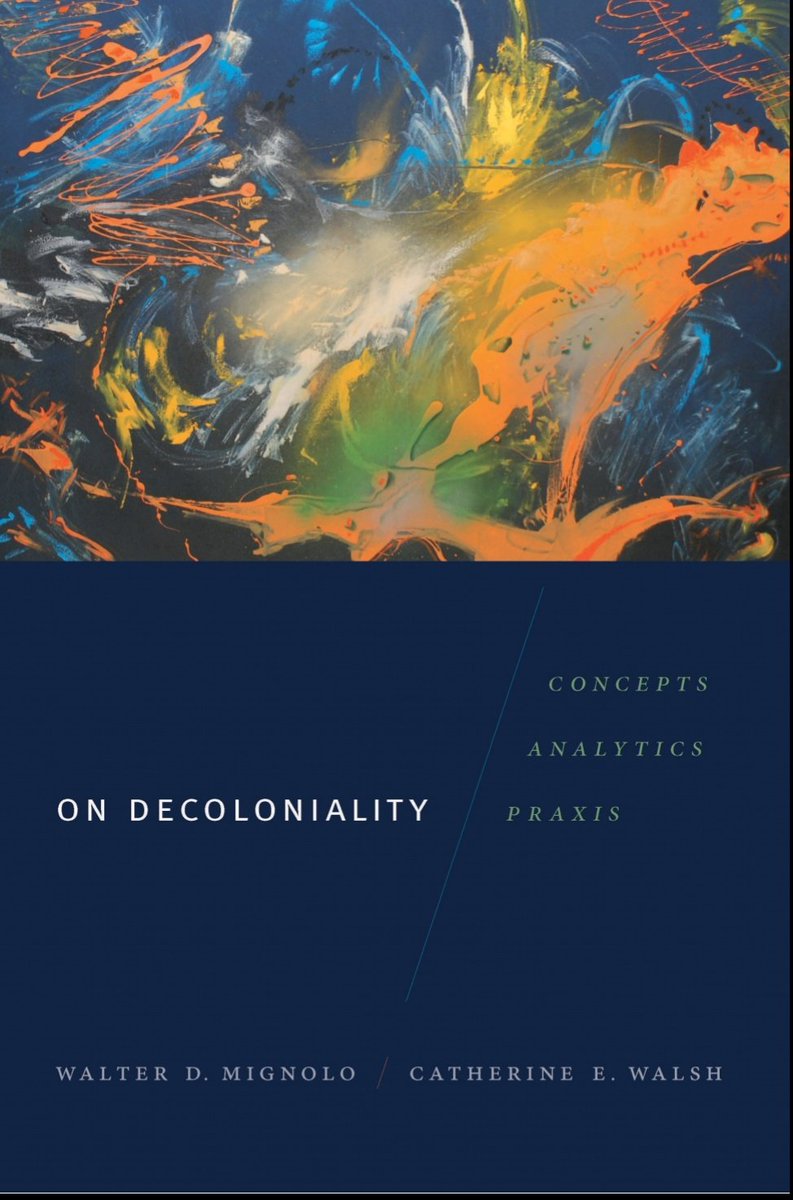
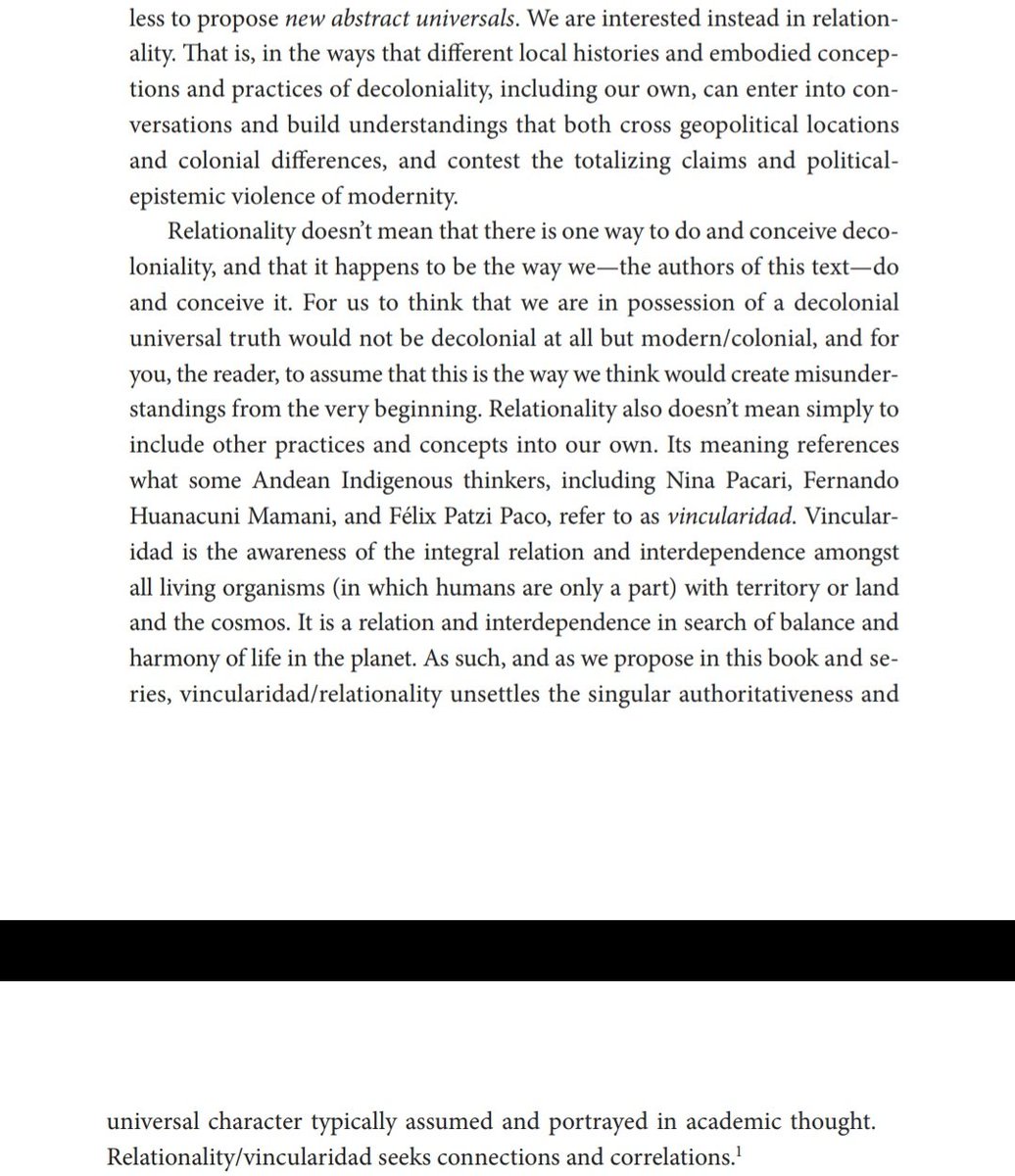
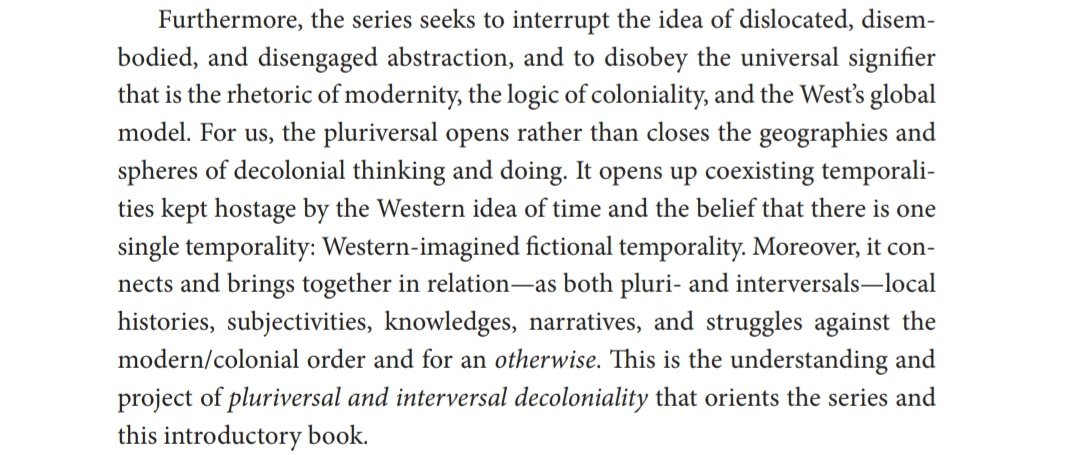
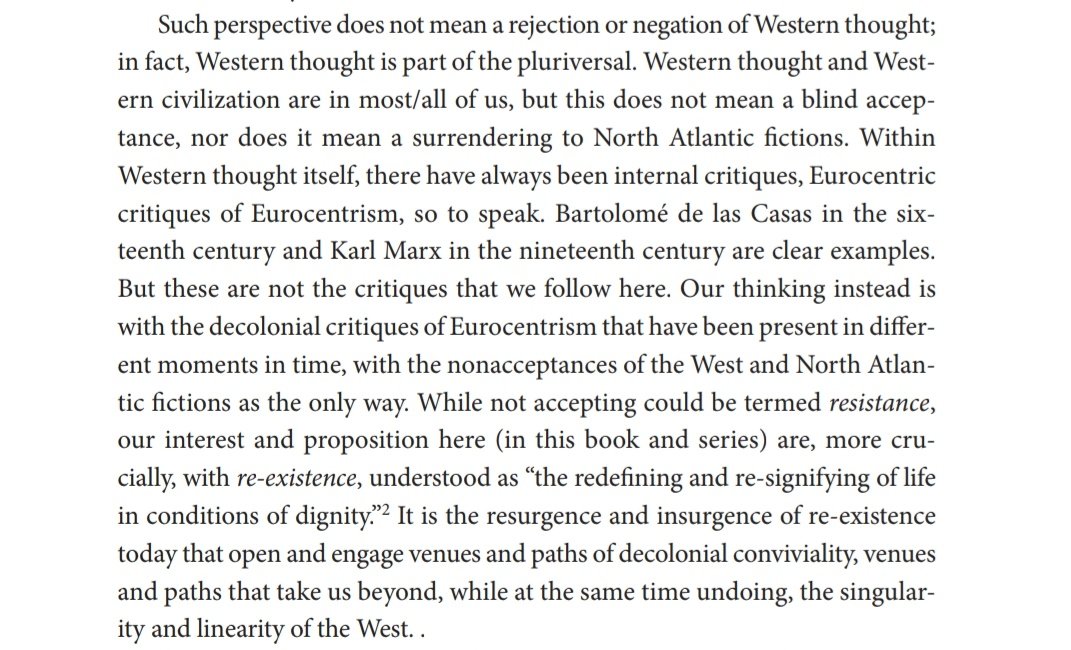



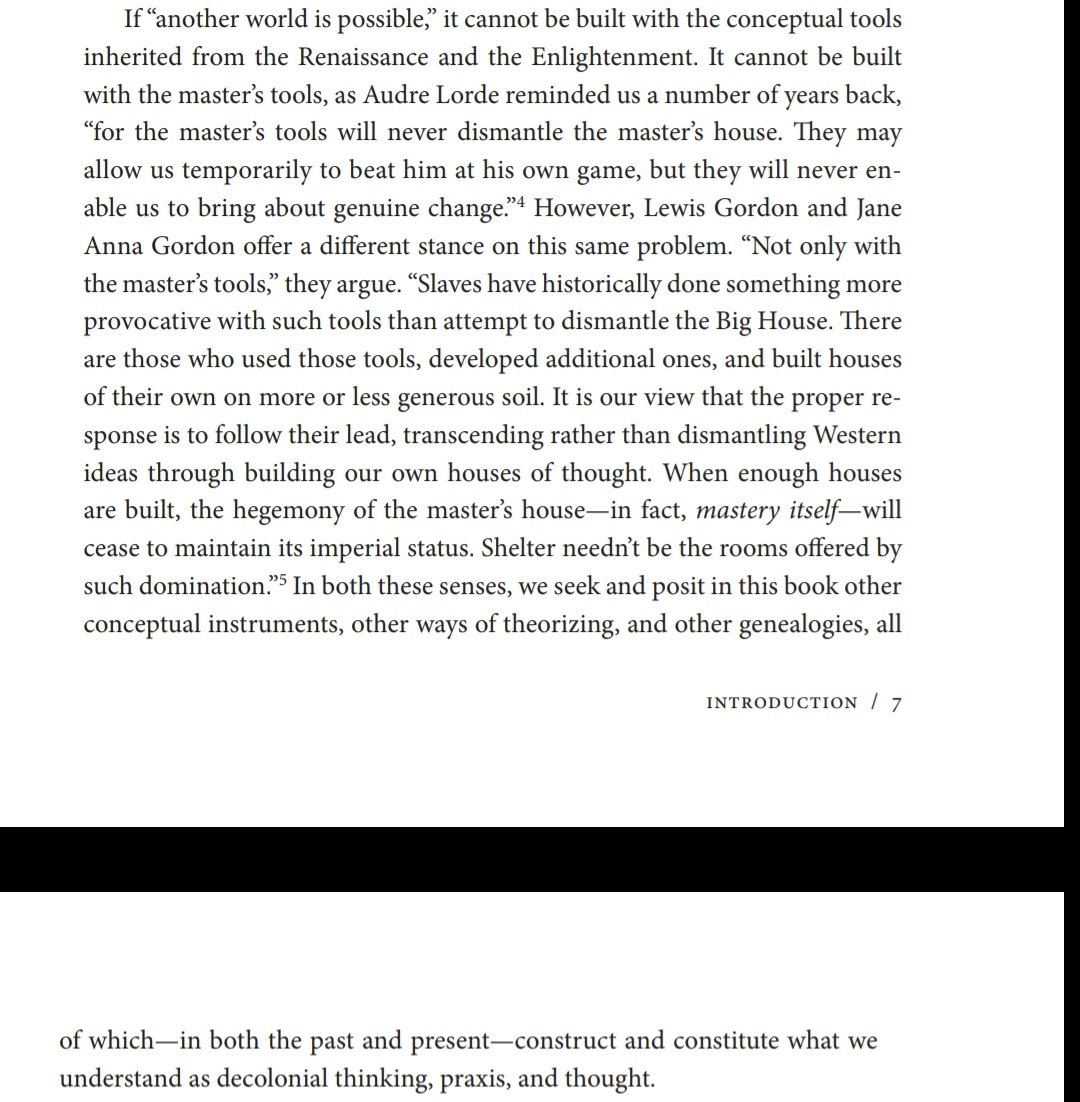
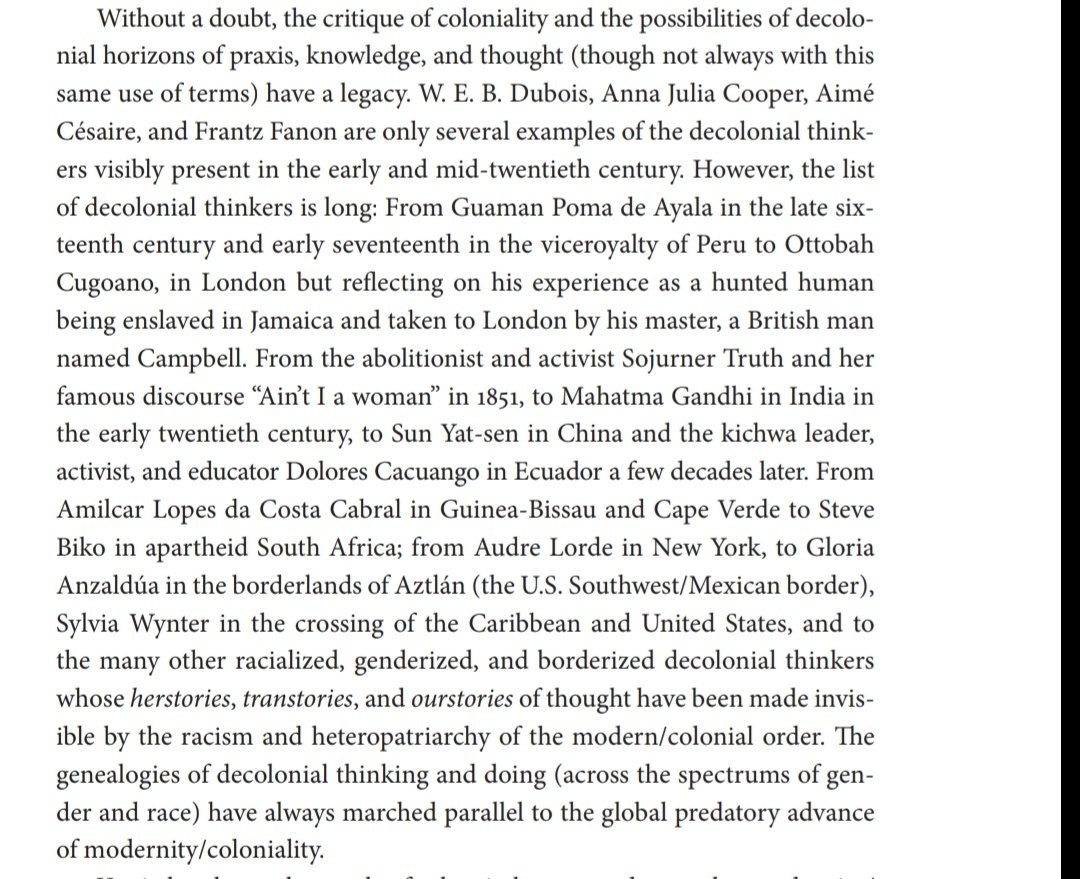

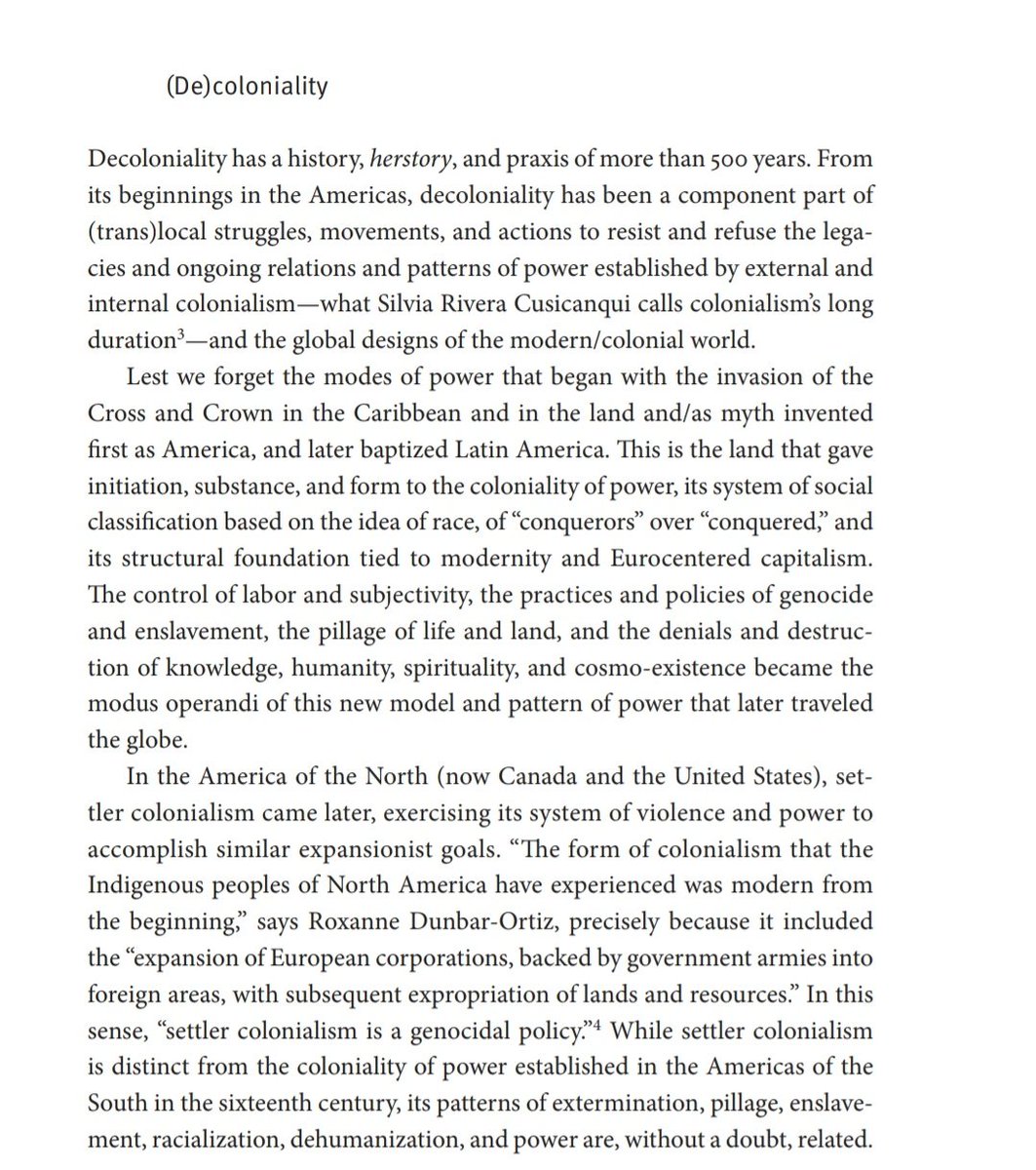
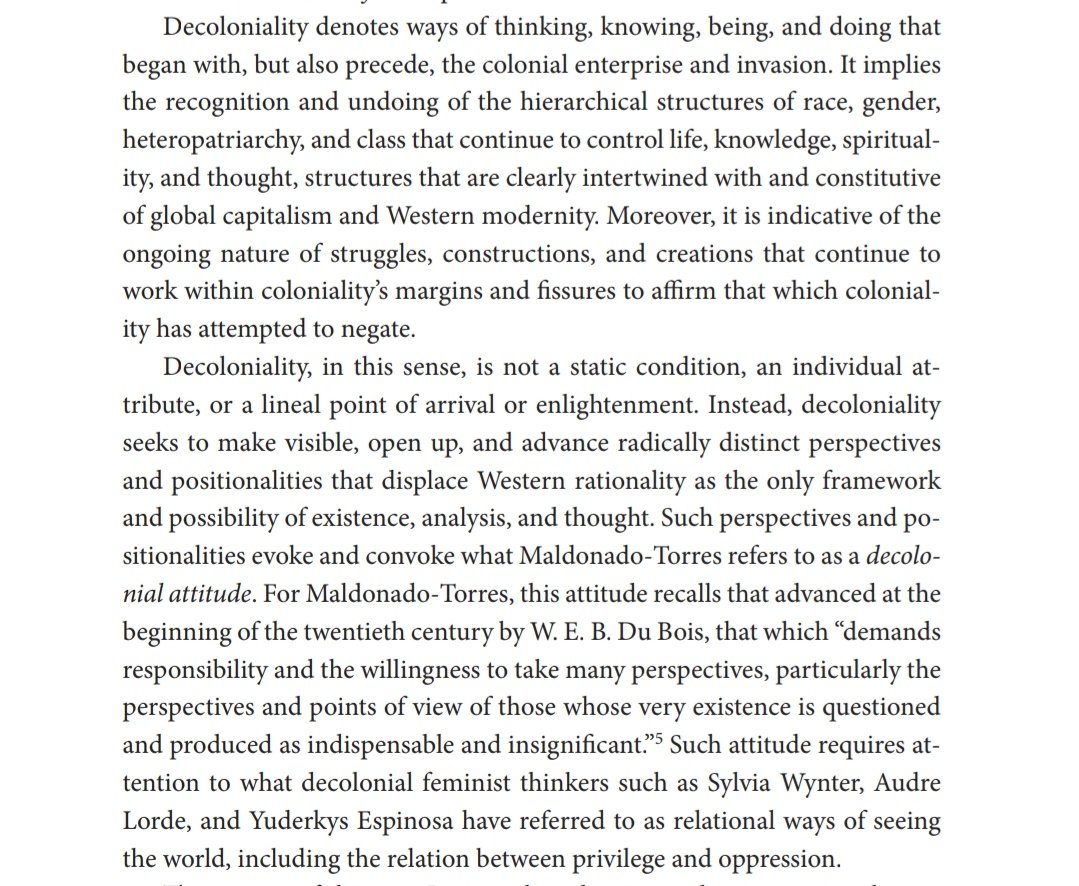

![[Decoloniality] "is not to write about, nor is it to develop a narrative by simply citing a plethora of authors ... Rather, it is to think from and with standpoints, struggles, and practices ... it is to think from and with struggles that think and thought that struggles" [Decoloniality] "is not to write about, nor is it to develop a narrative by simply citing a plethora of authors ... Rather, it is to think from and with standpoints, struggles, and practices ... it is to think from and with struggles that think and thought that struggles"](https://pbs.twimg.com/media/EWntgMYXQAI3NUm.jpg)
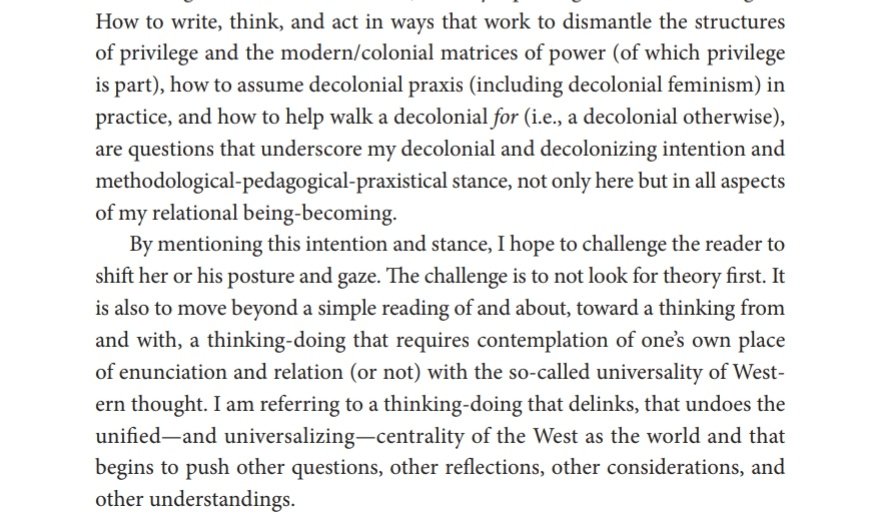
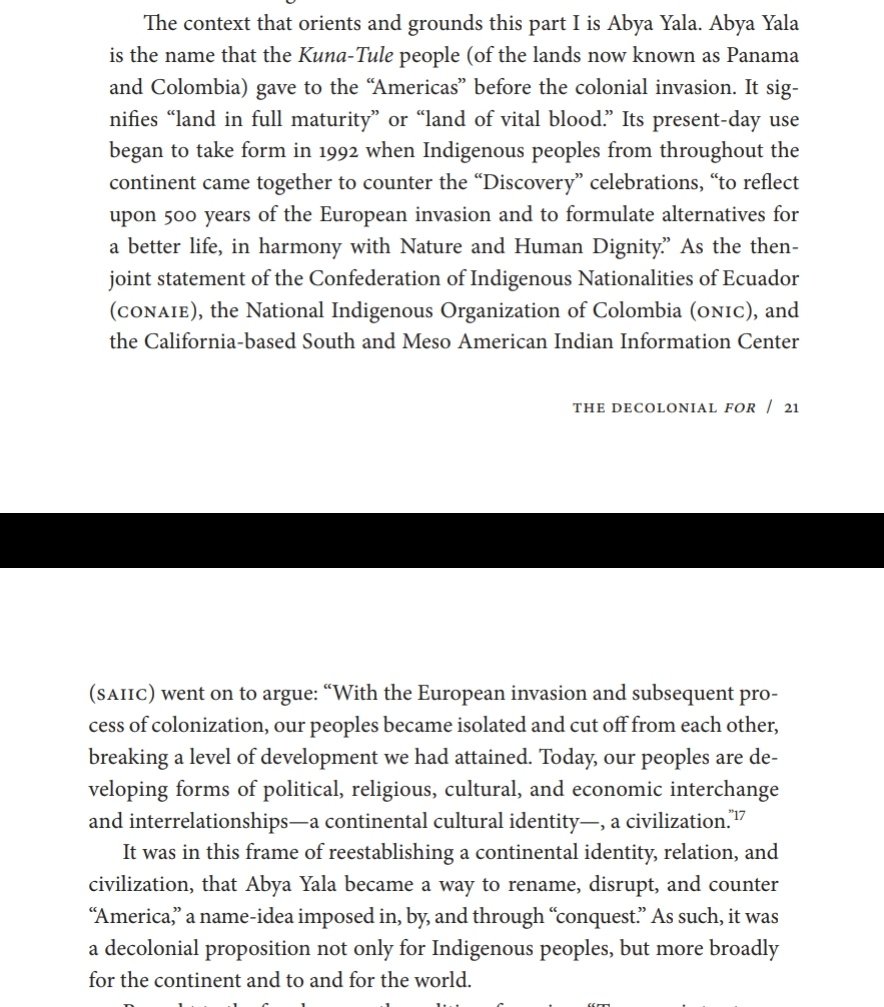
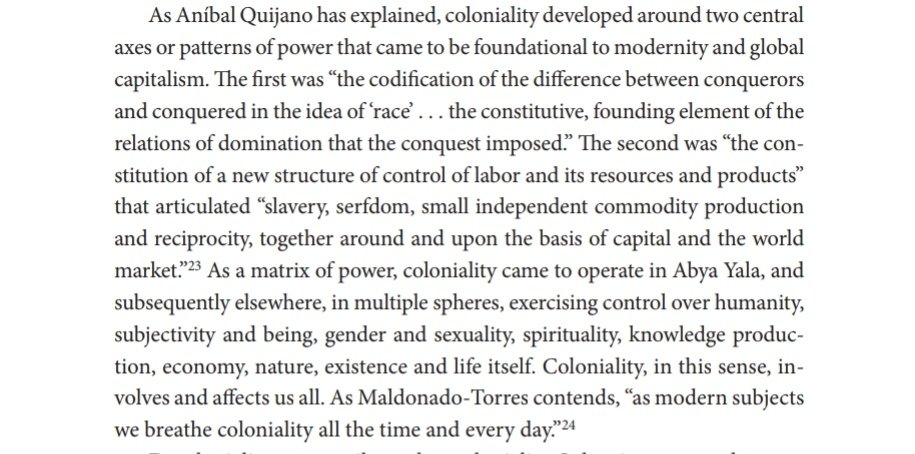
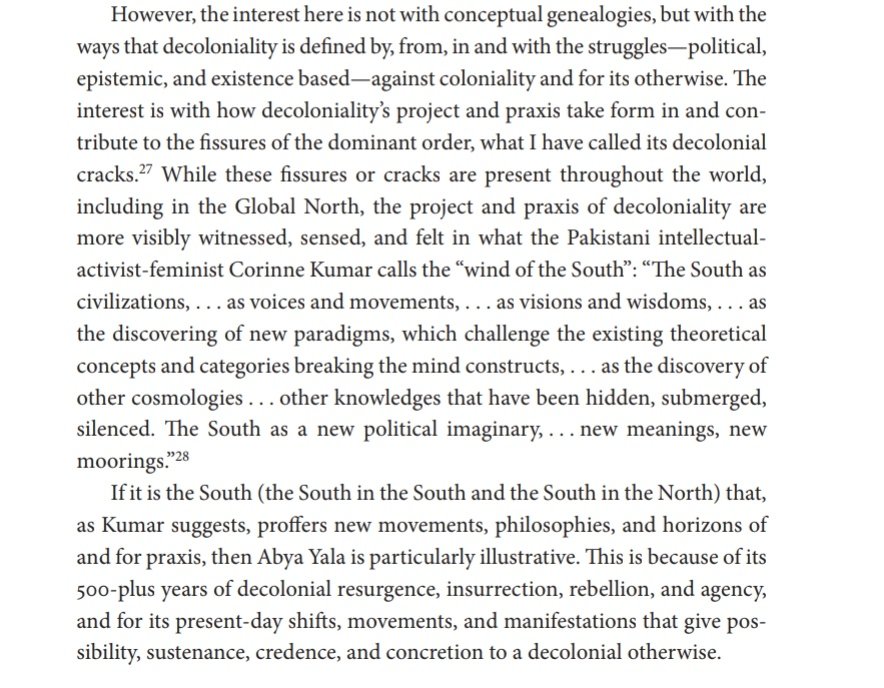
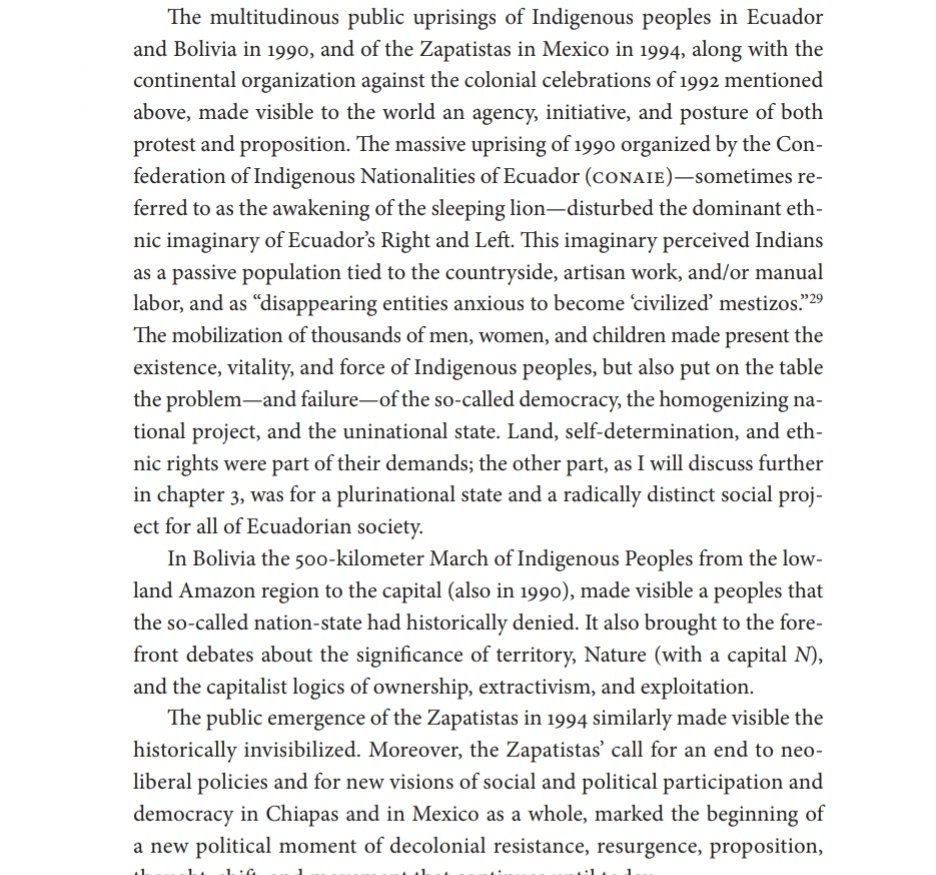
![[To challenge the colonial matrix of power in theory & praxis] "is to recall Arturo Escobar’s argument made over a decade ago about “the need to take seriously the epistemic force of local histories and to think theory through from the political praxis of subaltern groups.” [To challenge the colonial matrix of power in theory & praxis] "is to recall Arturo Escobar’s argument made over a decade ago about “the need to take seriously the epistemic force of local histories and to think theory through from the political praxis of subaltern groups.”](https://pbs.twimg.com/media/EWnvq4EXYAc0Djn.jpg)
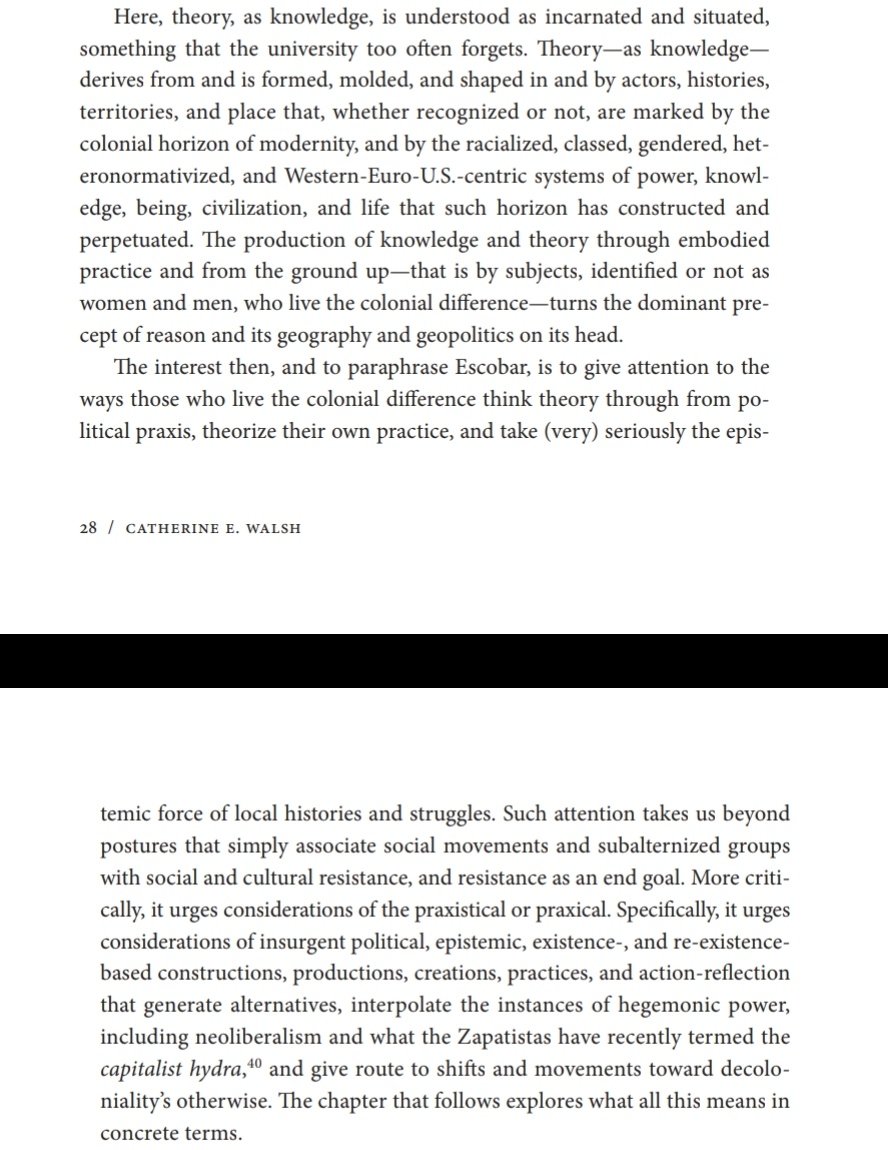
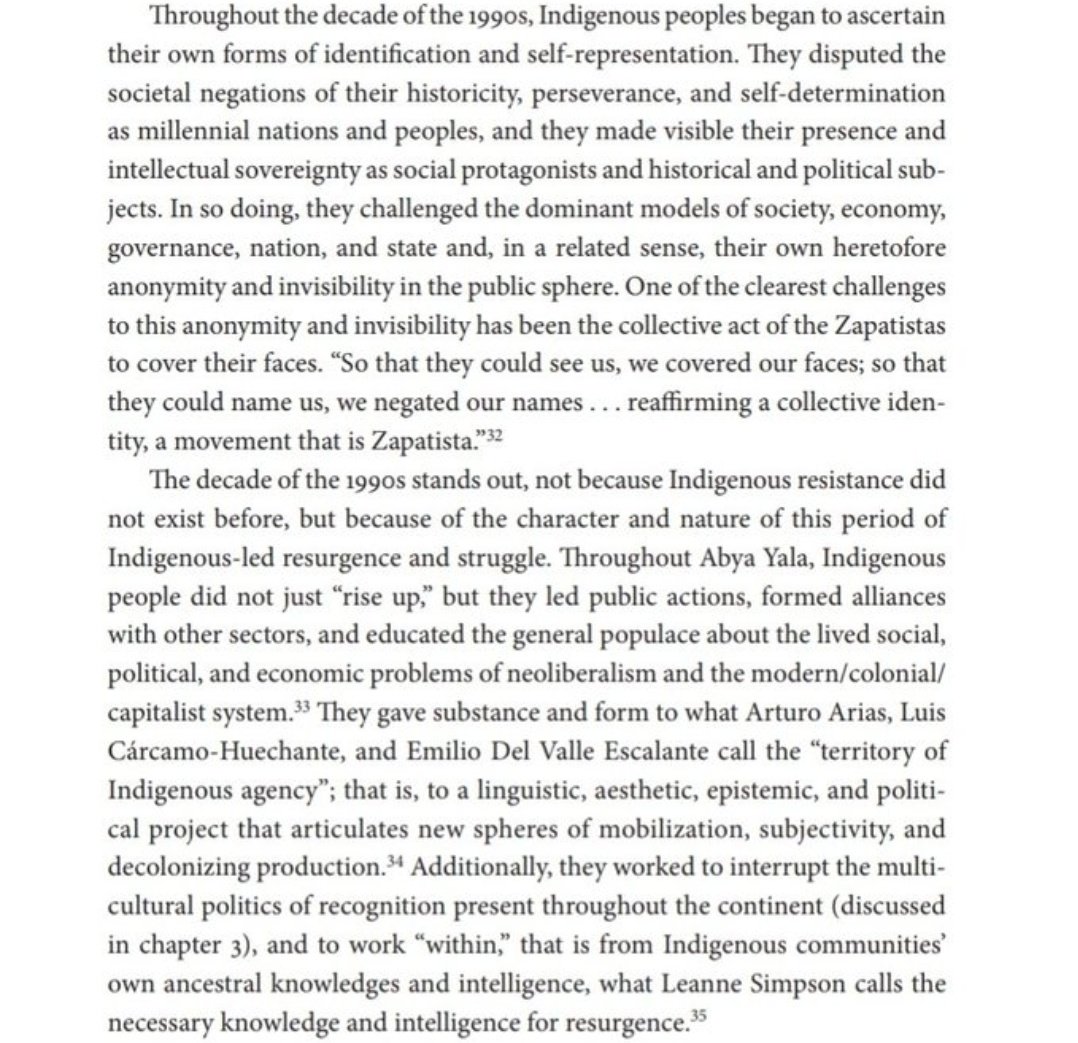
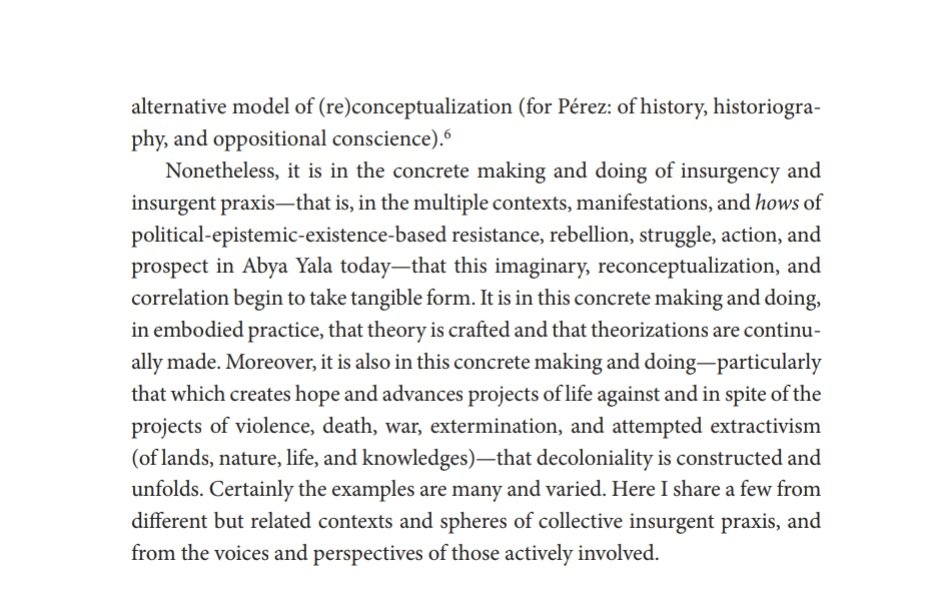
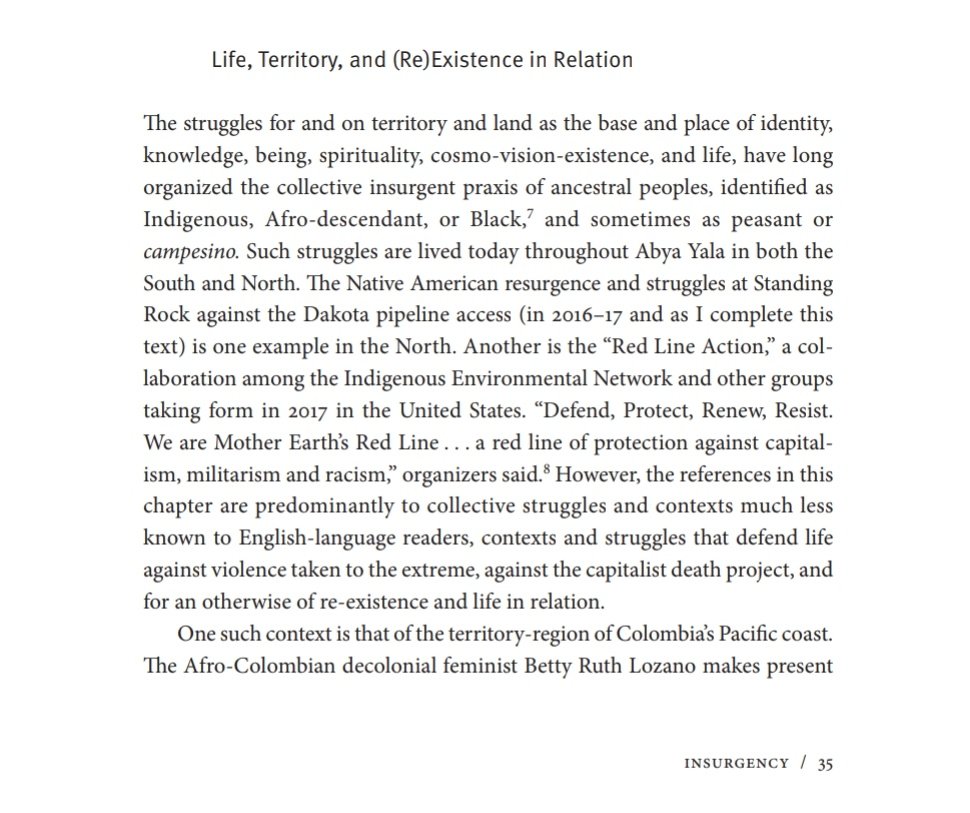
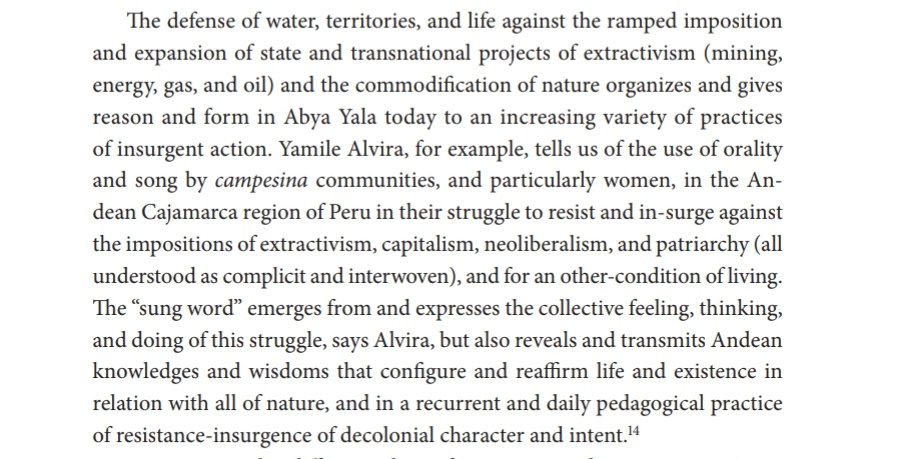

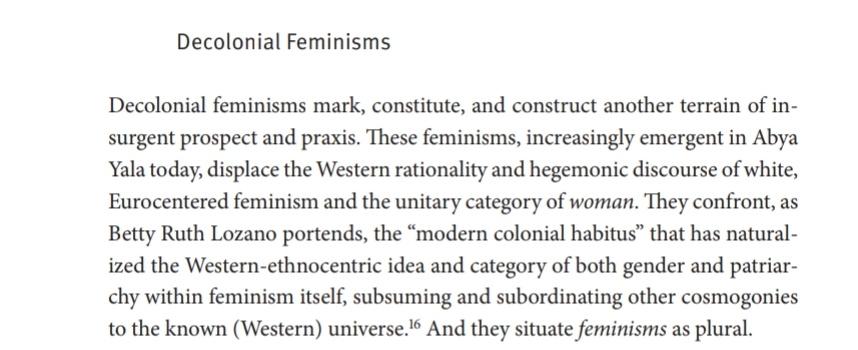
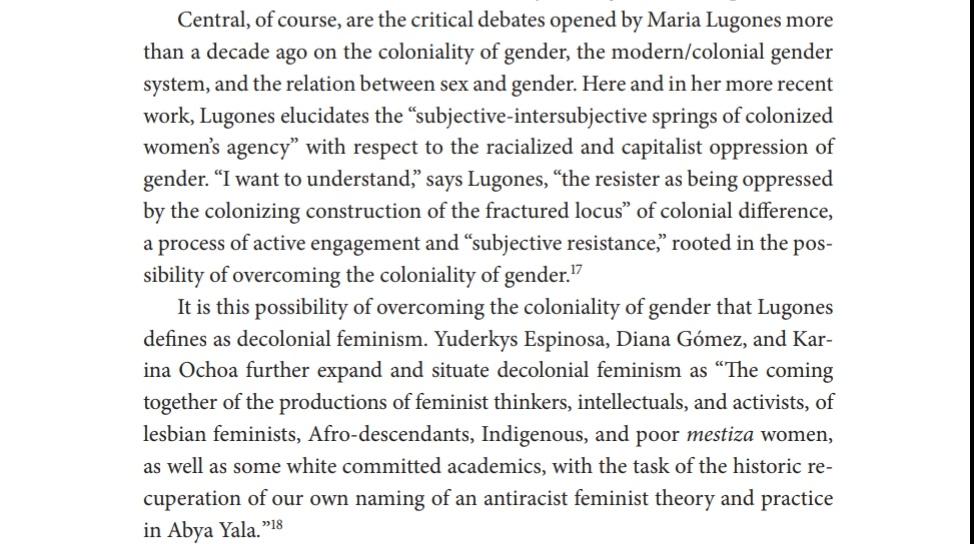
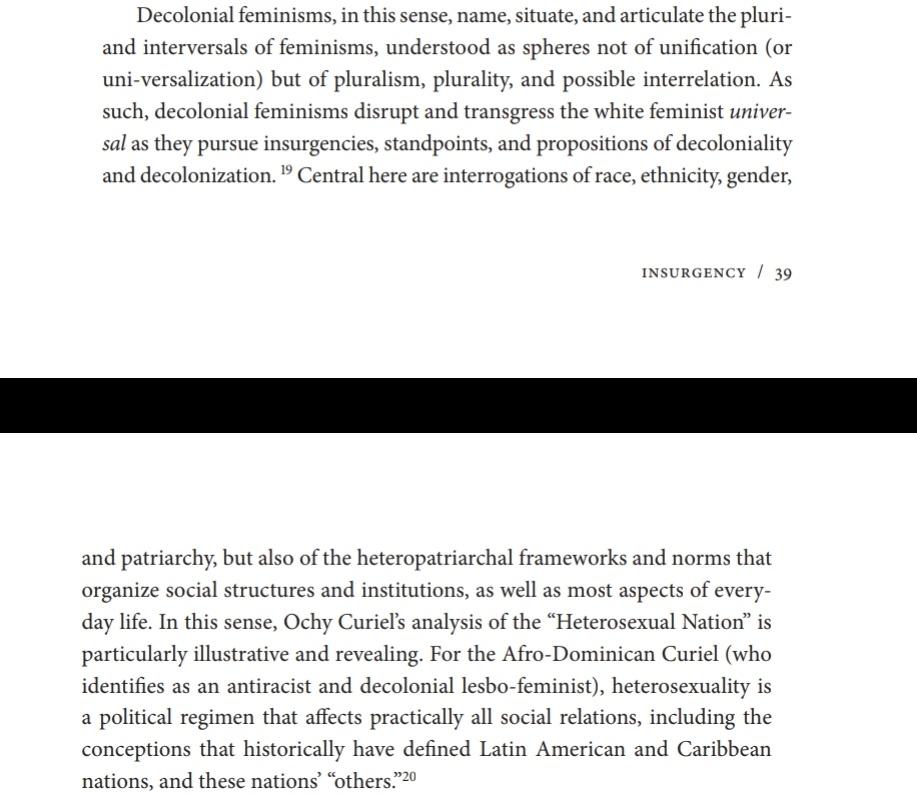
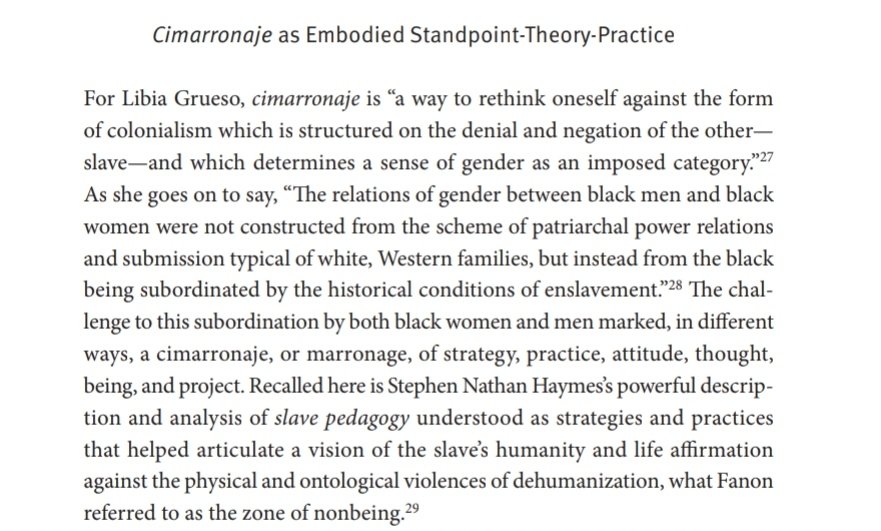
!["The concept of a cimarron habitus - is useful in that it helps us comprehend how black maroon communities resisted [& confronted] the violence of the colonial system and the ways in which these communities developed strategies of survival, social unity, and social organization" "The concept of a cimarron habitus - is useful in that it helps us comprehend how black maroon communities resisted [& confronted] the violence of the colonial system and the ways in which these communities developed strategies of survival, social unity, and social organization"](https://pbs.twimg.com/media/EW0PJBHXYAcc-__.jpg)
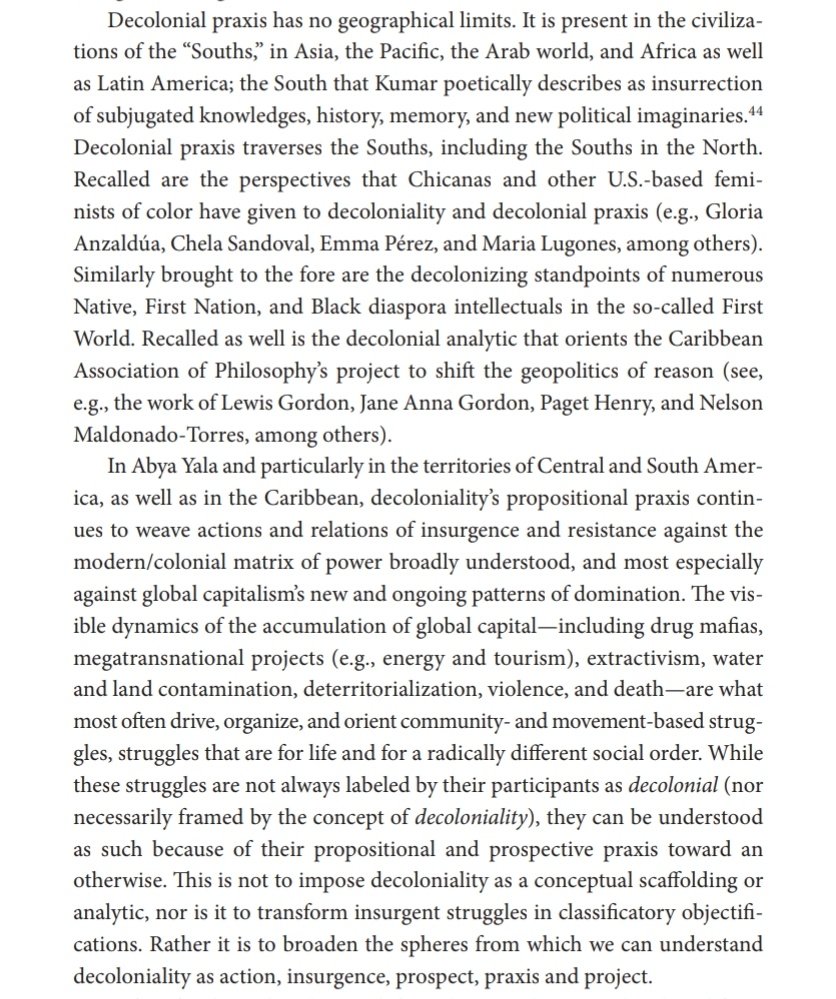
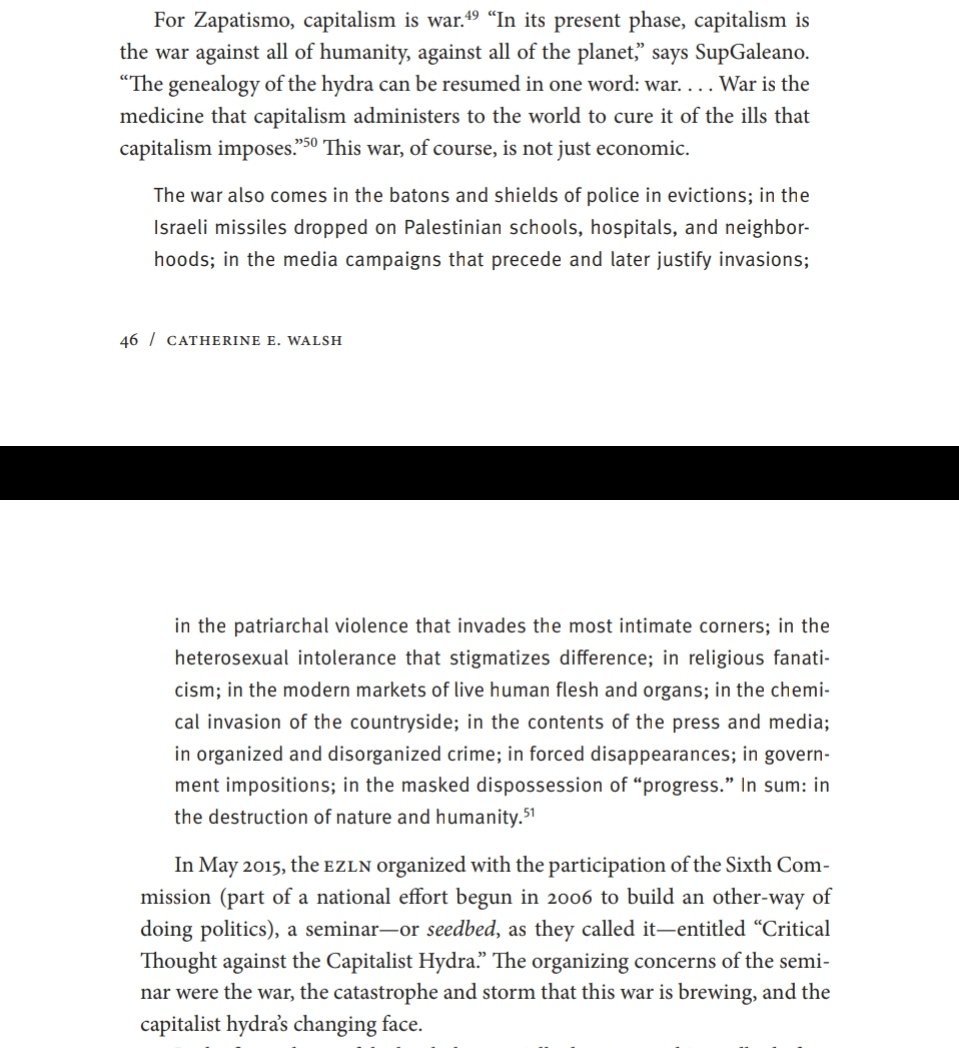
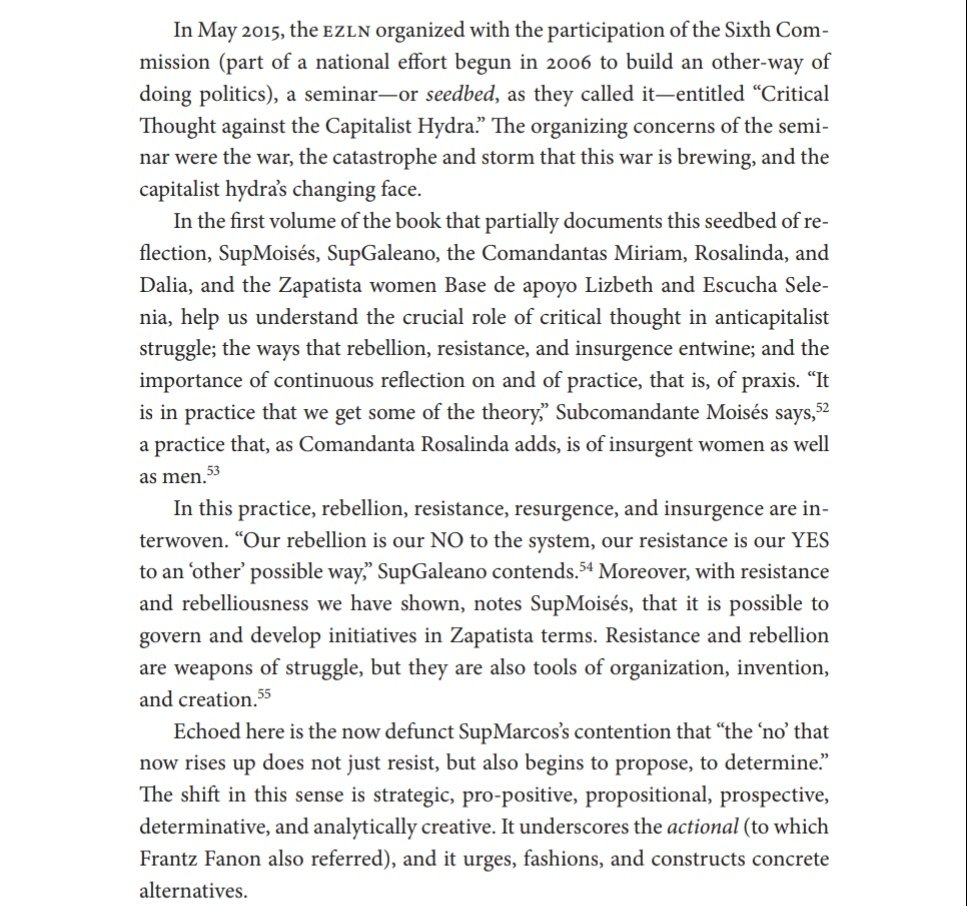
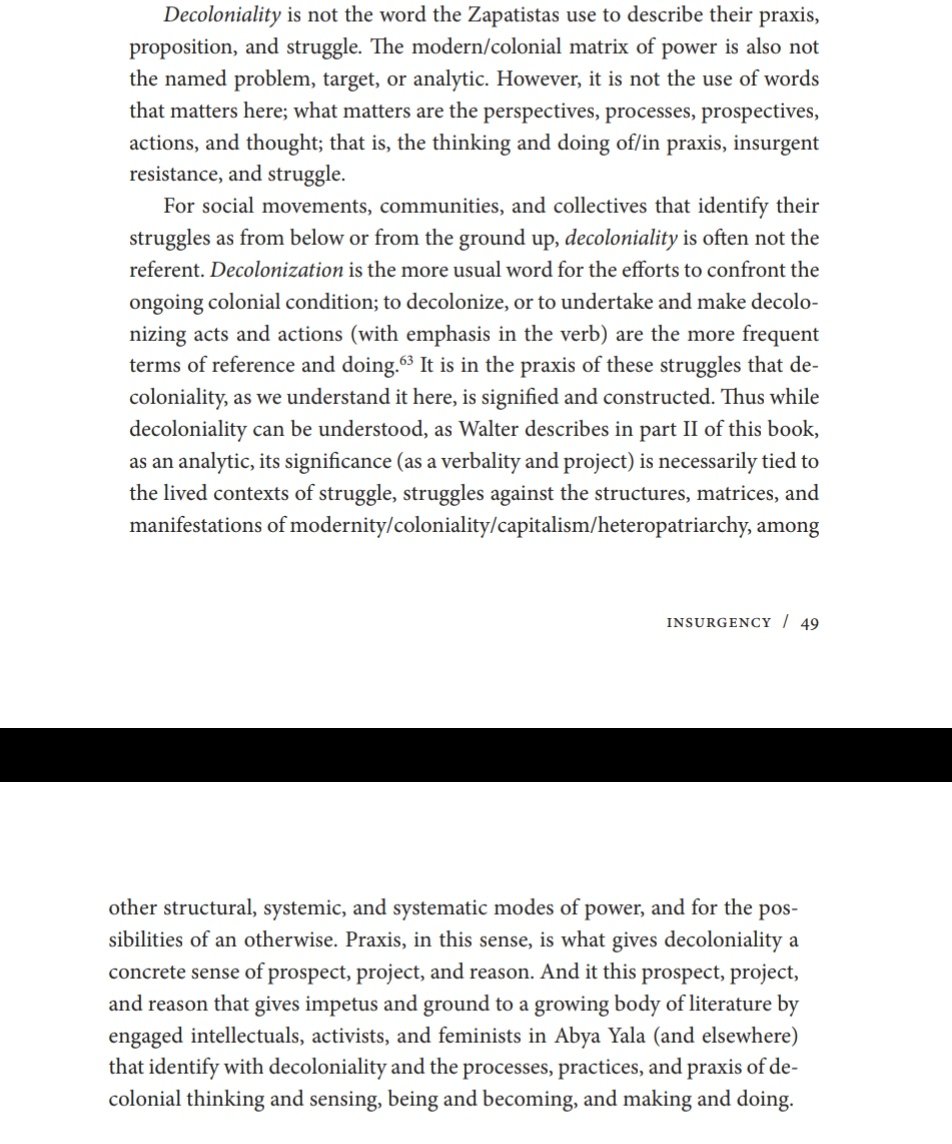
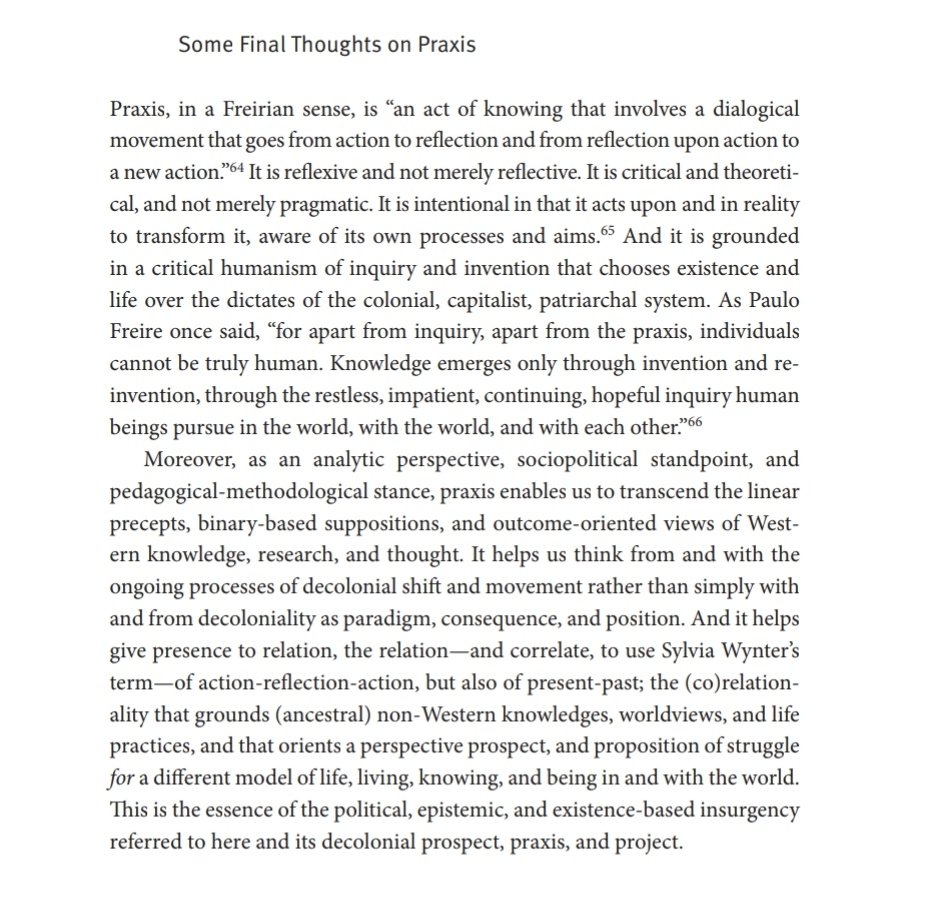
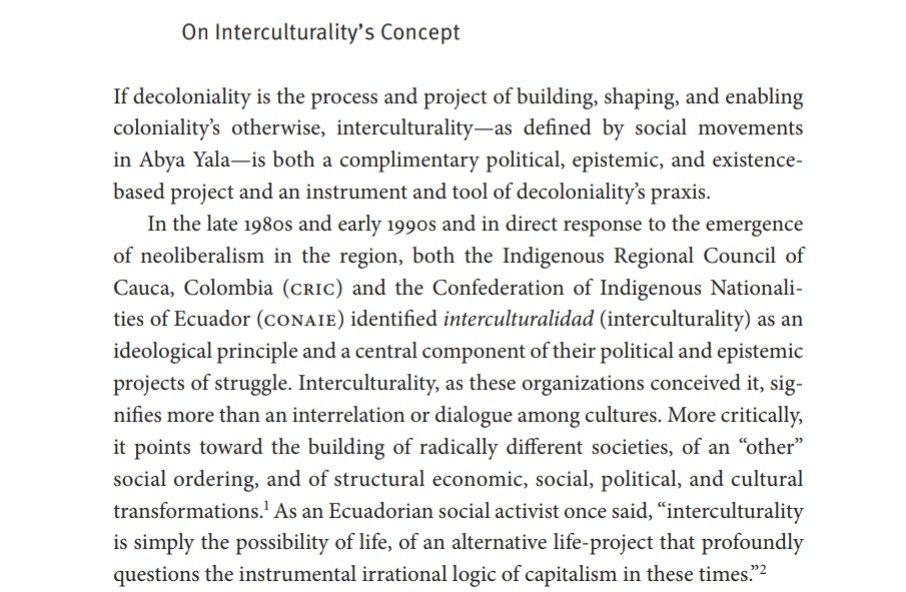
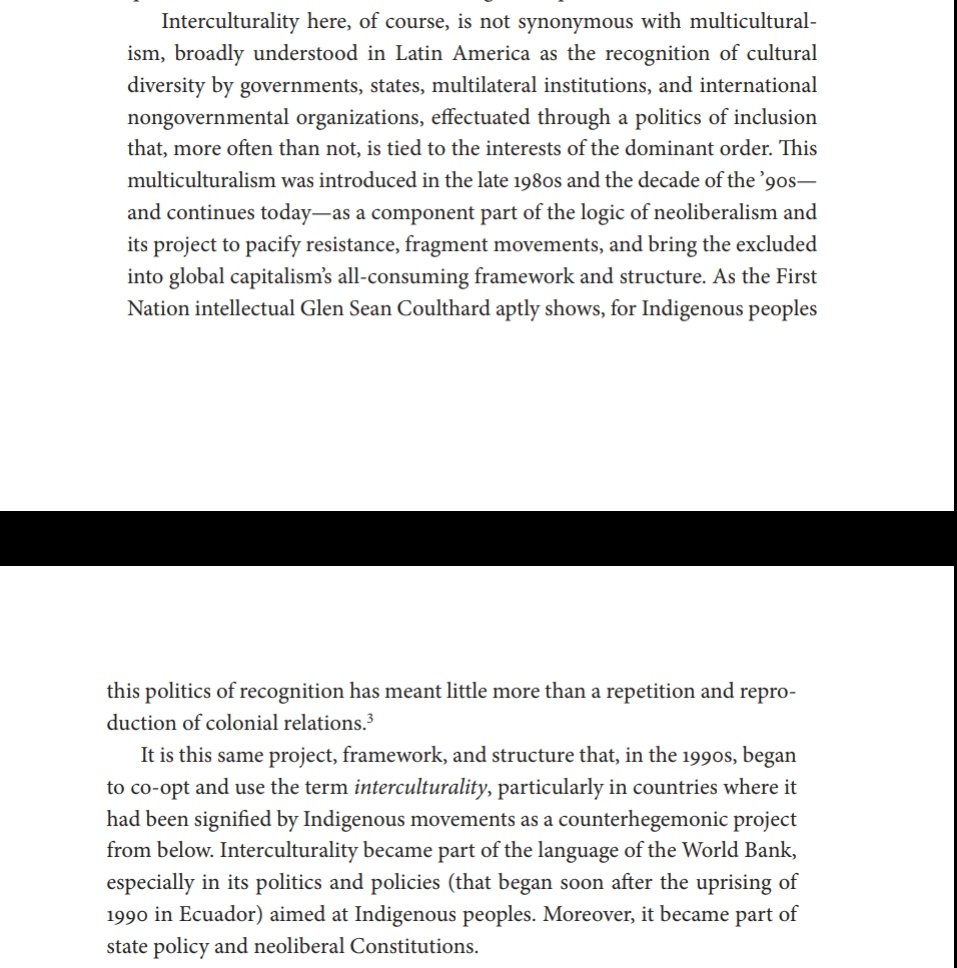
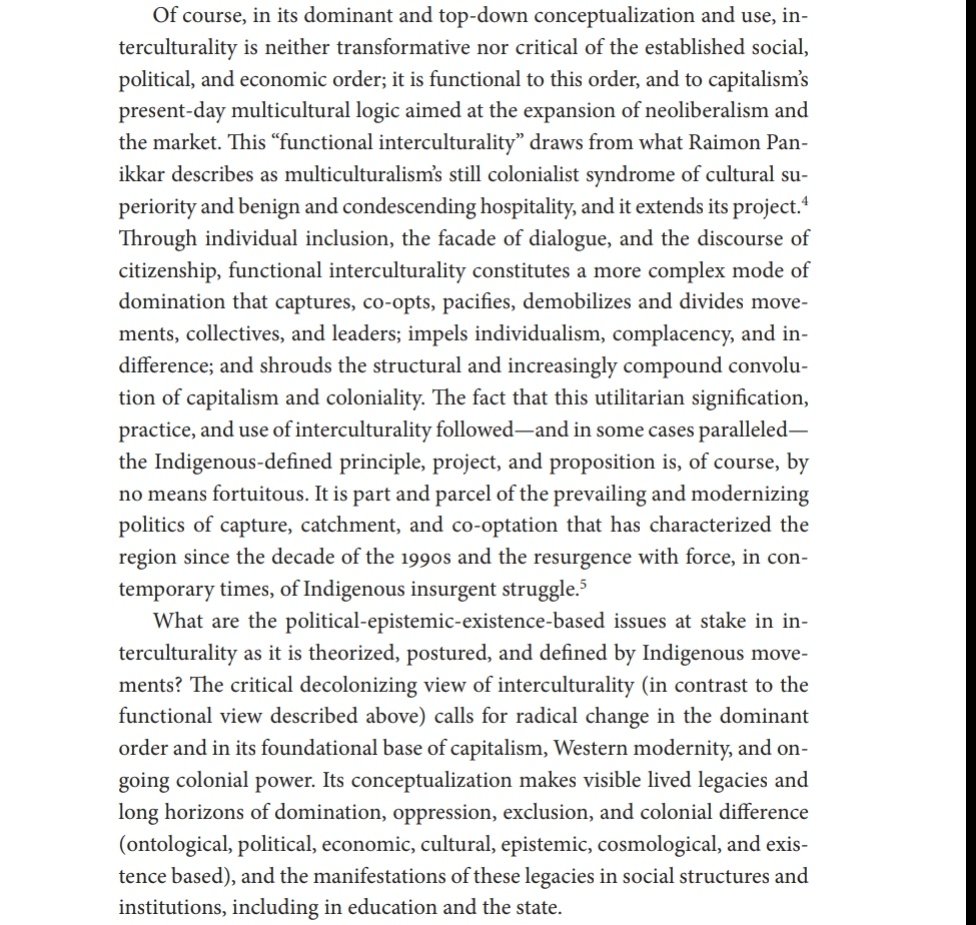
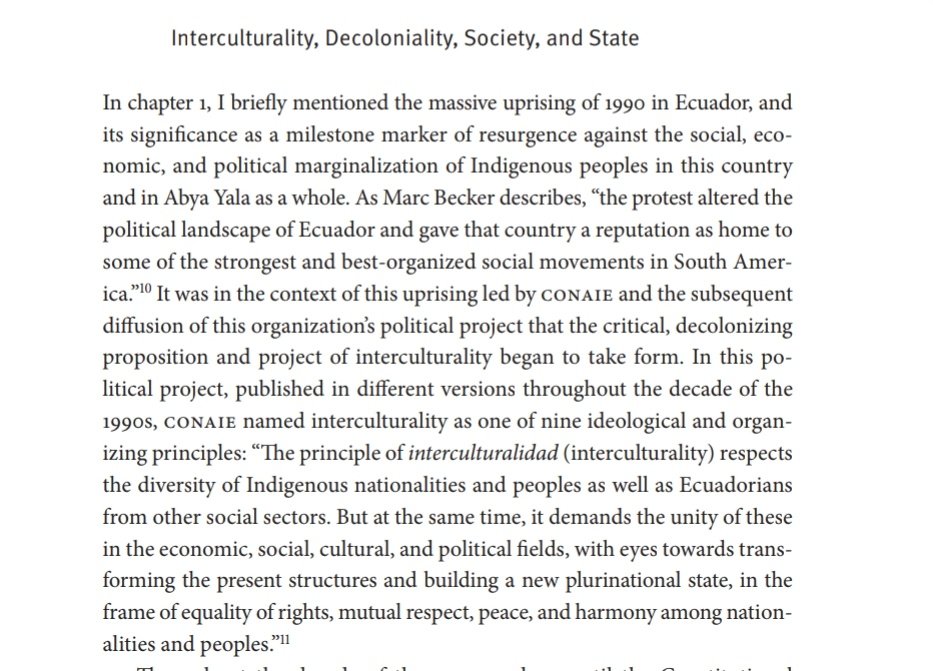

!["interculturality was key in the construction of a “new democracyanti-colonialist, anti-capitalist, anti-imperialist, and anti-segregationist” .. that would guarantee “the full and permanent participation of the [Indigenous] peoples and nationalities in decision making” "interculturality was key in the construction of a “new democracyanti-colonialist, anti-capitalist, anti-imperialist, and anti-segregationist” .. that would guarantee “the full and permanent participation of the [Indigenous] peoples and nationalities in decision making”](https://pbs.twimg.com/media/EXHKHp-WoAAi5LV.jpg)
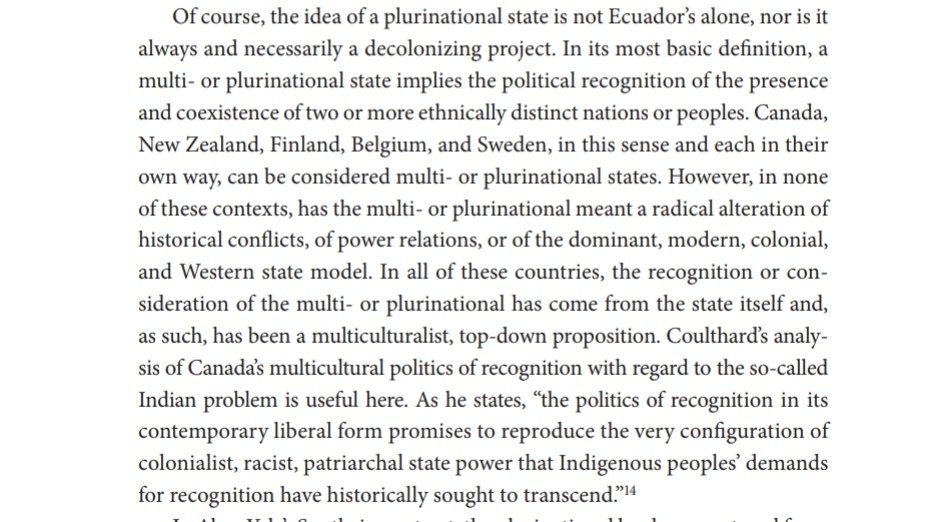
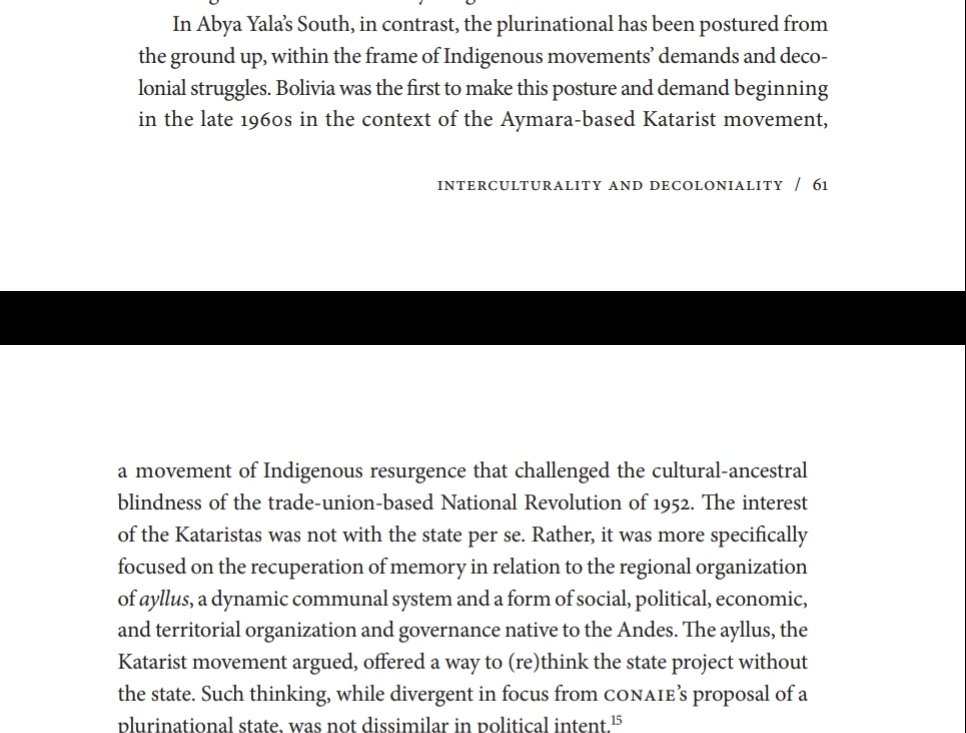
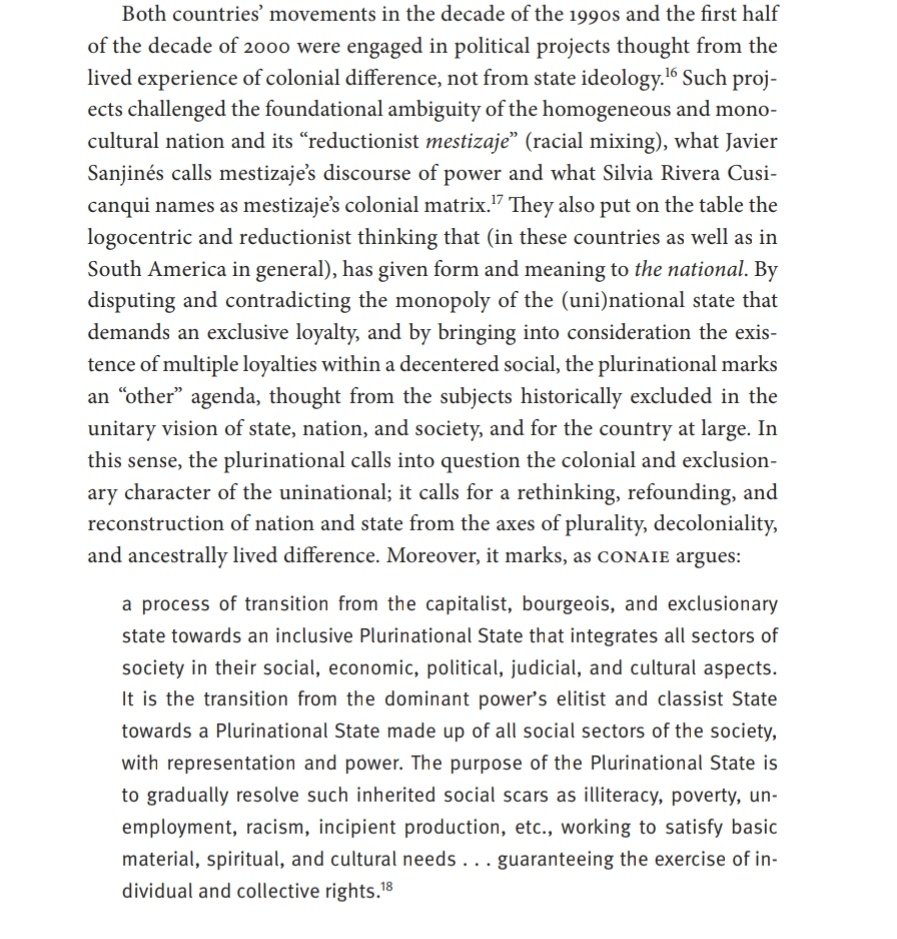
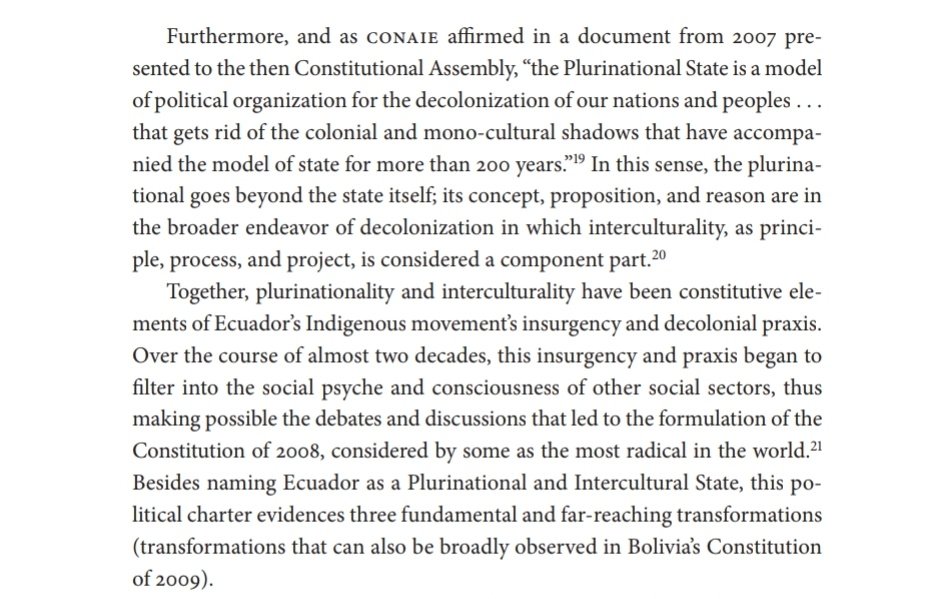

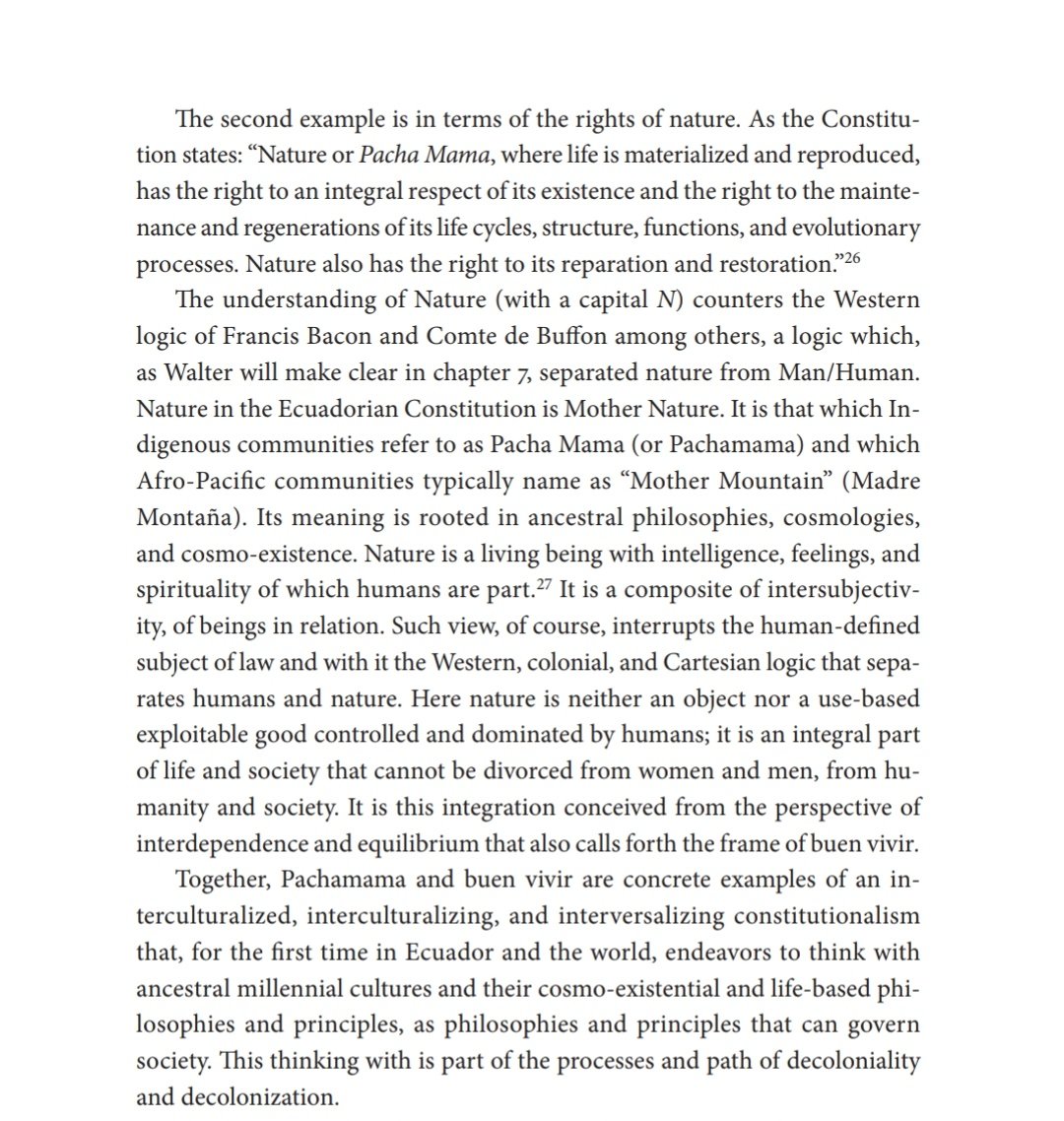

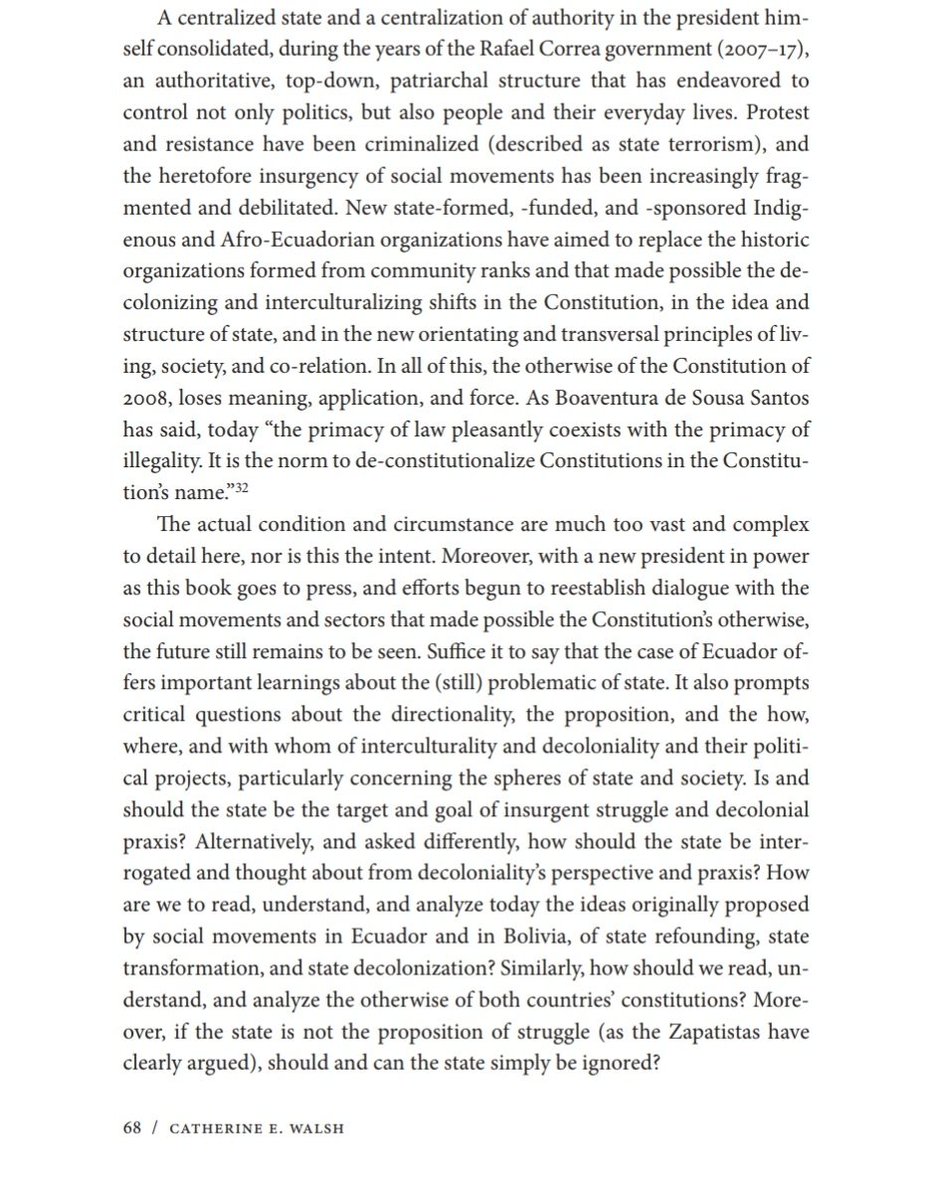
![[Decoloniality if misinterpreted] "leads to simplifications ... These simplifications .. reduce the Indigenous to an ethnic category, thus obscuring the political.. epistemic, ontological & existence-based violence & struggle that began with the imposed category of.. “Indian.” [Decoloniality if misinterpreted] "leads to simplifications ... These simplifications .. reduce the Indigenous to an ethnic category, thus obscuring the political.. epistemic, ontological & existence-based violence & struggle that began with the imposed category of.. “Indian.”](https://pbs.twimg.com/media/EXqd2FRXkAI-TFv.jpg)
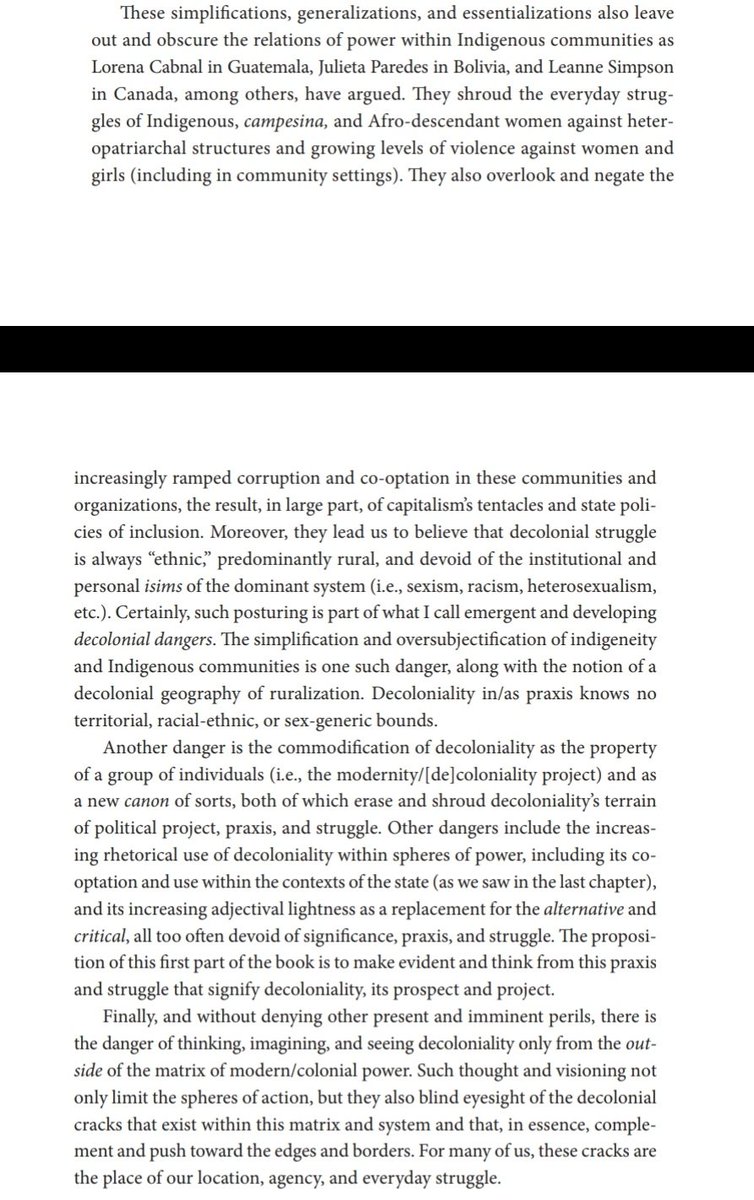
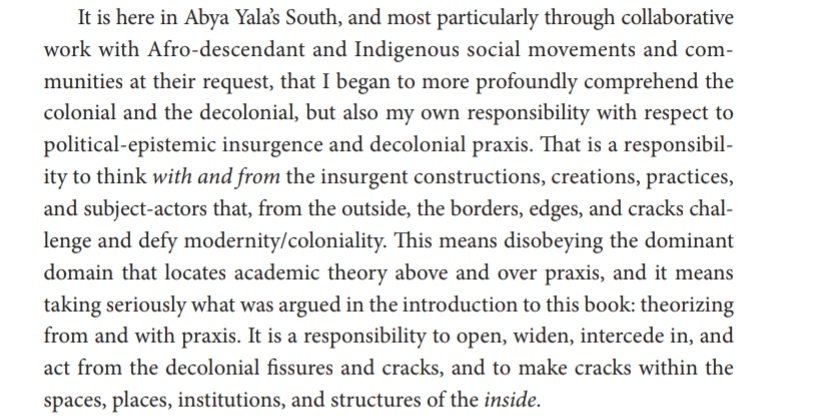
!["It is in the social, political, epistemic, and existential contexts of struggle that “leaders and peoples, mutually identified, together create the directive lines of their action [educational, political, and of liberation],” Freire said" "It is in the social, political, epistemic, and existential contexts of struggle that “leaders and peoples, mutually identified, together create the directive lines of their action [educational, political, and of liberation],” Freire said"](https://pbs.twimg.com/media/EXqx62UXQAEXf1F.jpg)
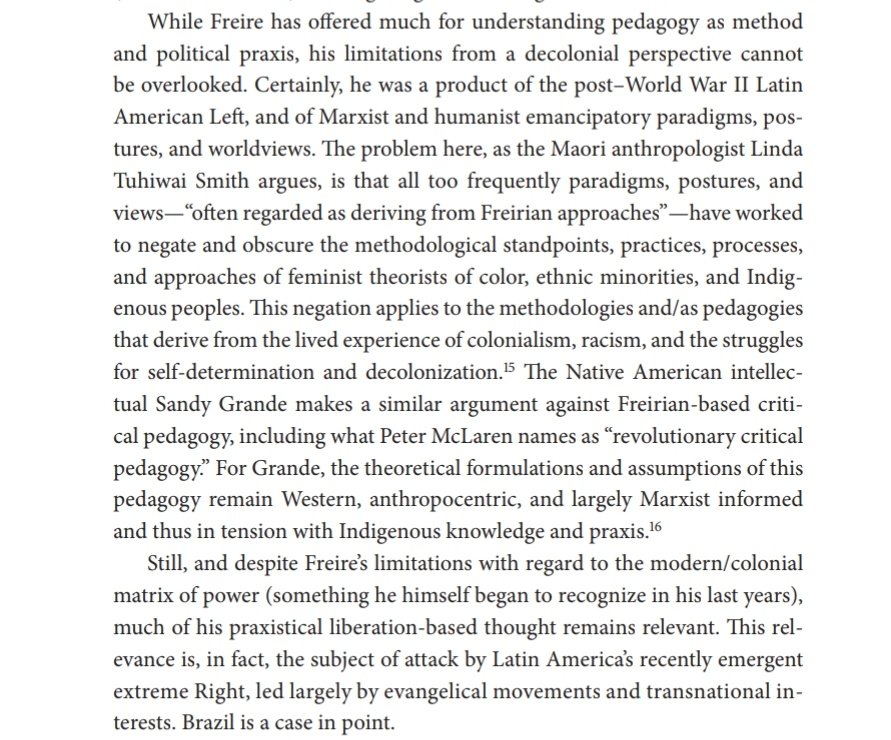

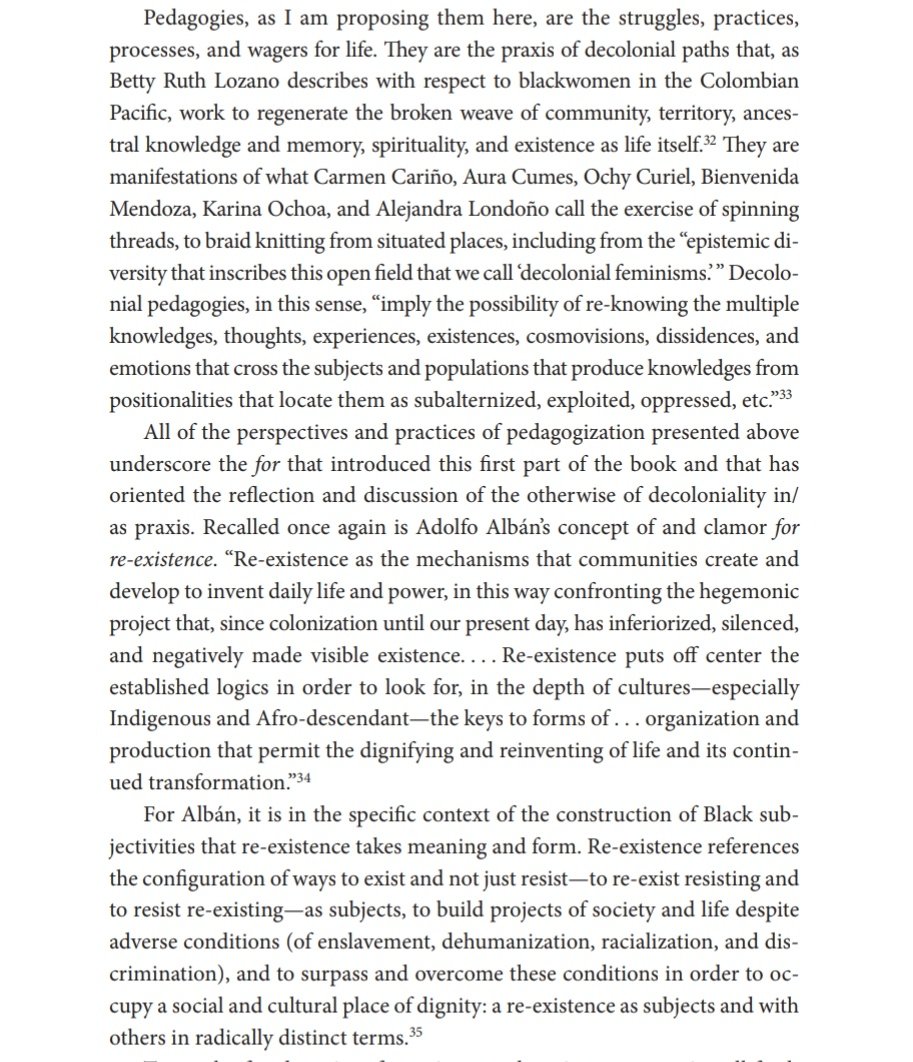
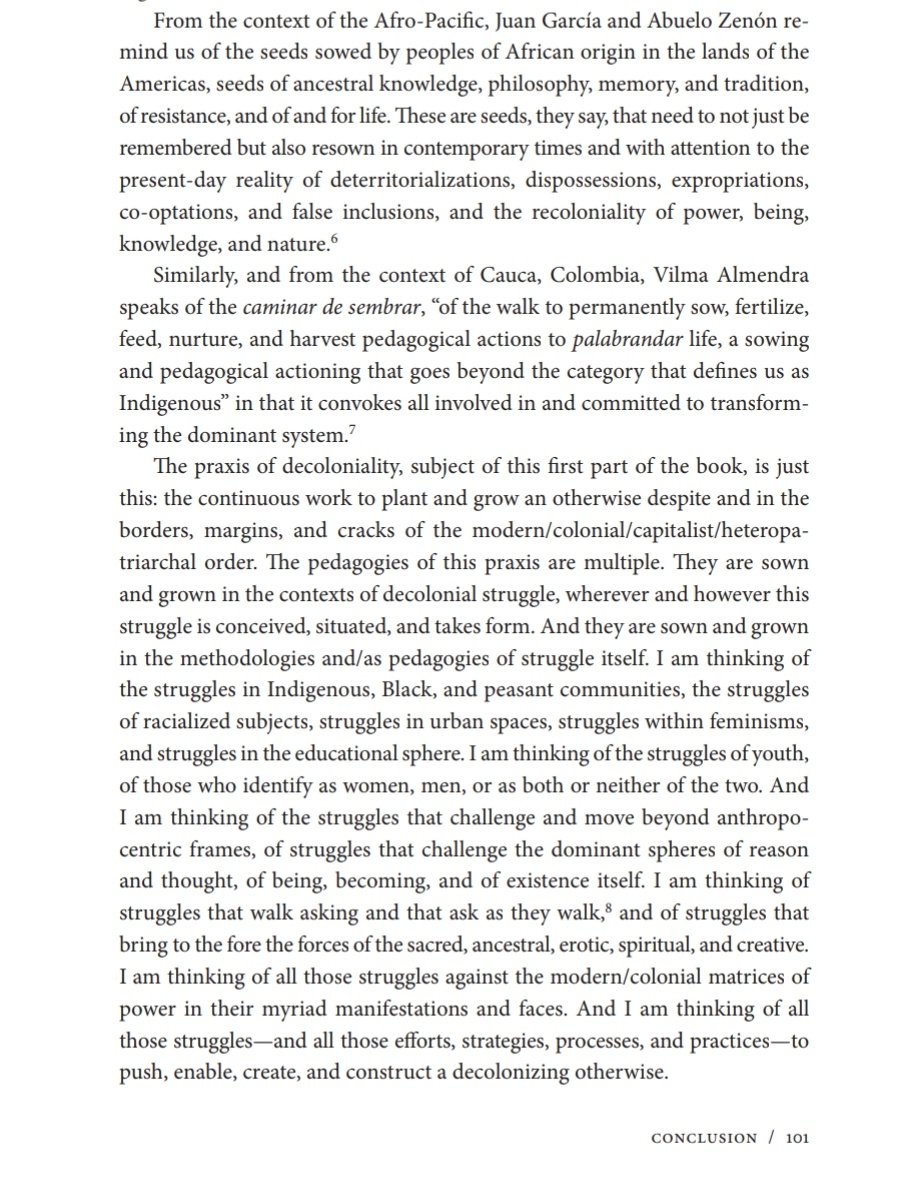

!["Quijano introduced the key and groundbreaking concept of coloniality right at the edge: [of the Cold War & Neoliberal "victory" ] ... The question then is to find out the task of decoloniality once it became evident that the state can be neither decolonized nor democratized." "Quijano introduced the key and groundbreaking concept of coloniality right at the edge: [of the Cold War & Neoliberal "victory" ] ... The question then is to find out the task of decoloniality once it became evident that the state can be neither decolonized nor democratized."](https://pbs.twimg.com/media/EYVhDvwWoAUcrMH.jpg)
!["[decoloniality] is not a postmodern conceptual introduction, in the sense of rejecting macronarratives. On the contrary, it claims the necessity of 500 years& #39; macronarratives of the colonial matrix of power that modern macronarratives disguised and postmodern philosophy ignored" "[decoloniality] is not a postmodern conceptual introduction, in the sense of rejecting macronarratives. On the contrary, it claims the necessity of 500 years& #39; macronarratives of the colonial matrix of power that modern macronarratives disguised and postmodern philosophy ignored"](https://pbs.twimg.com/media/EYVh3ObX0AILrSU.jpg)
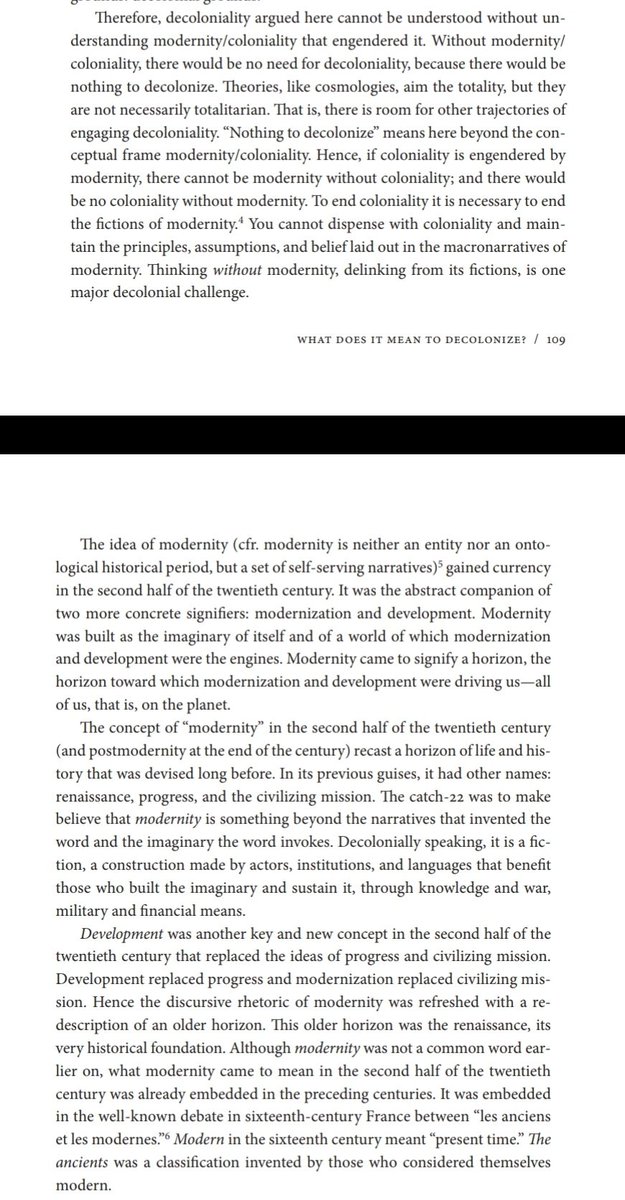
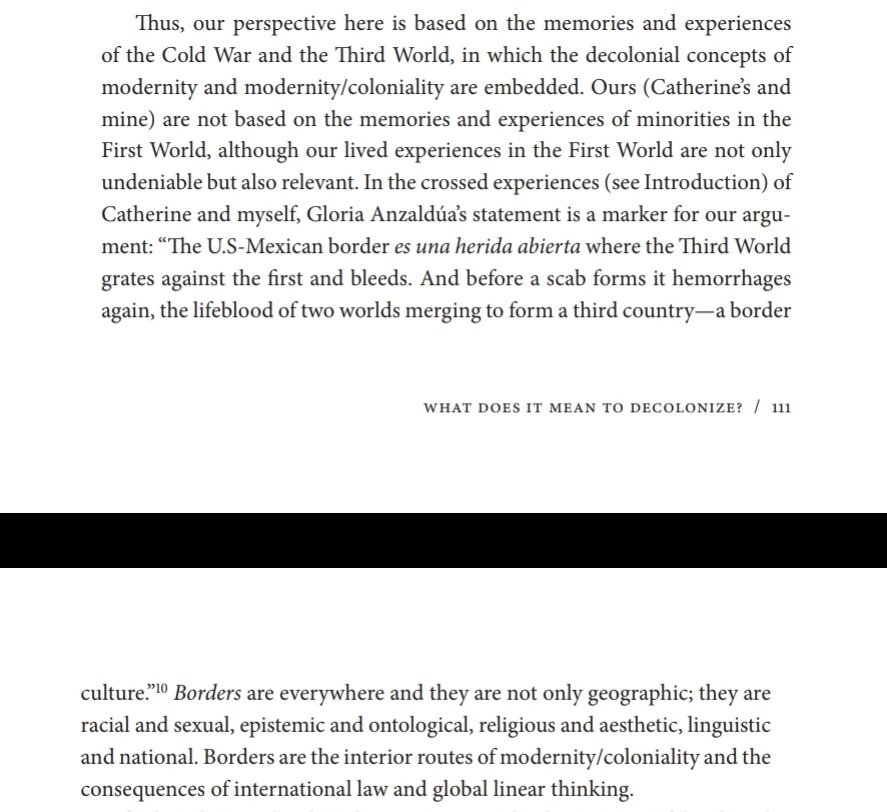
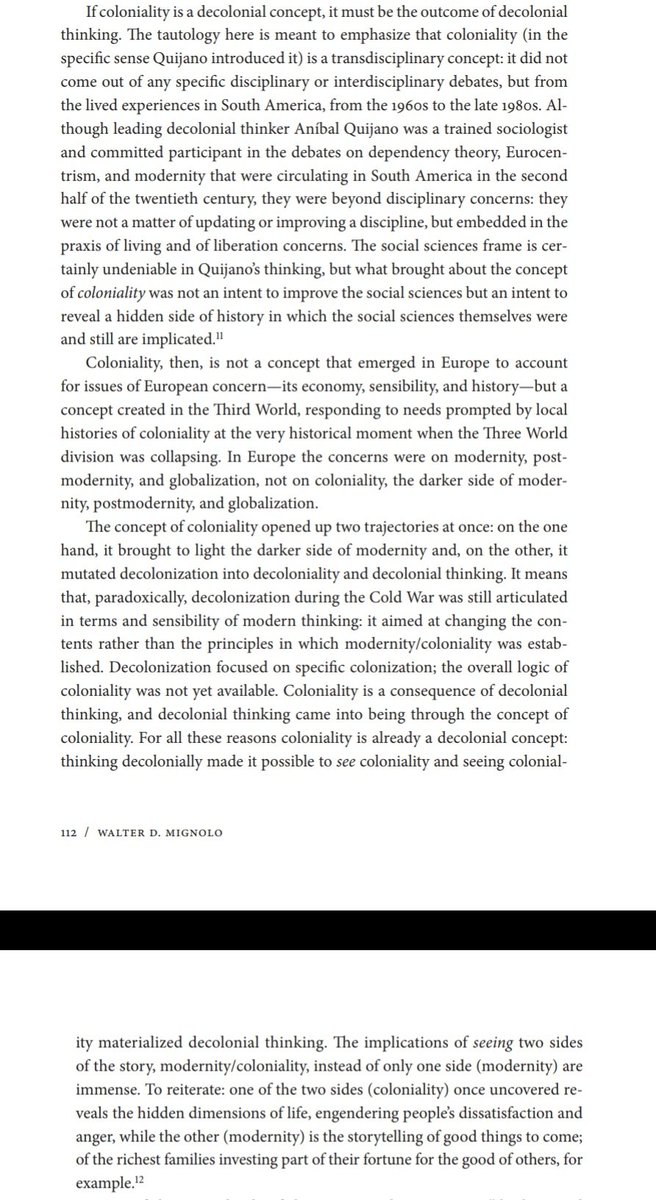
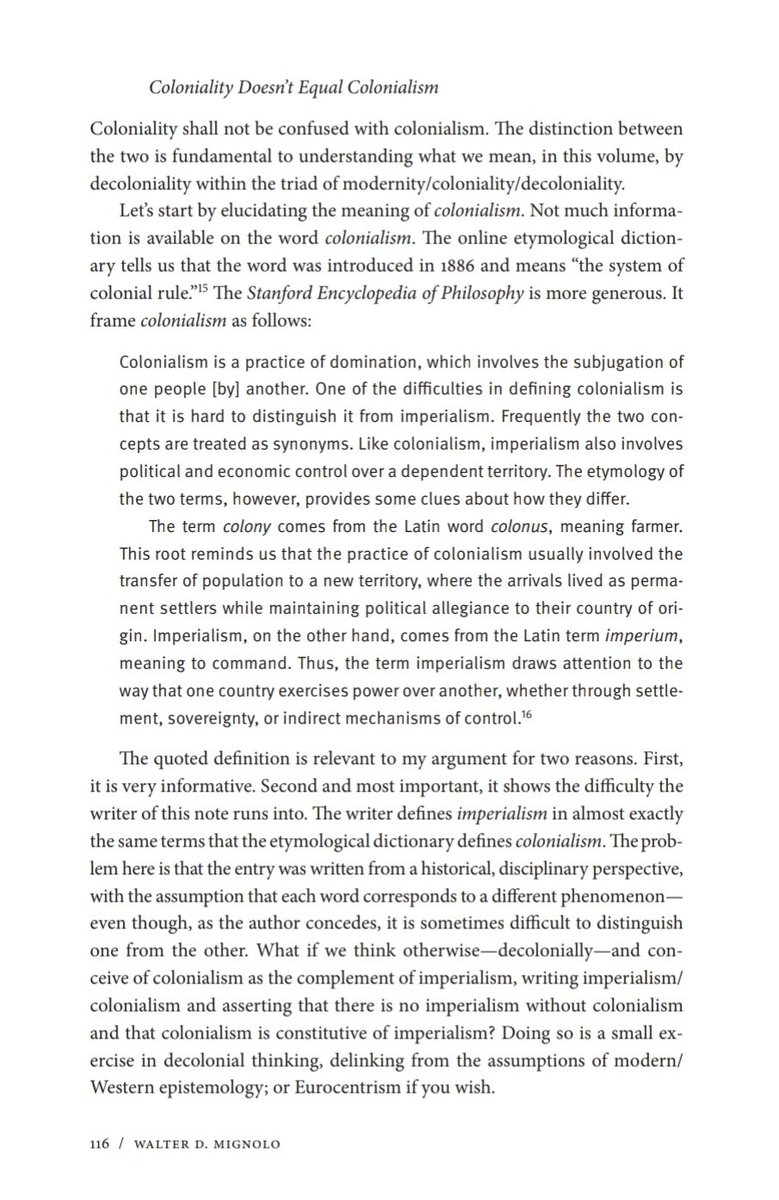
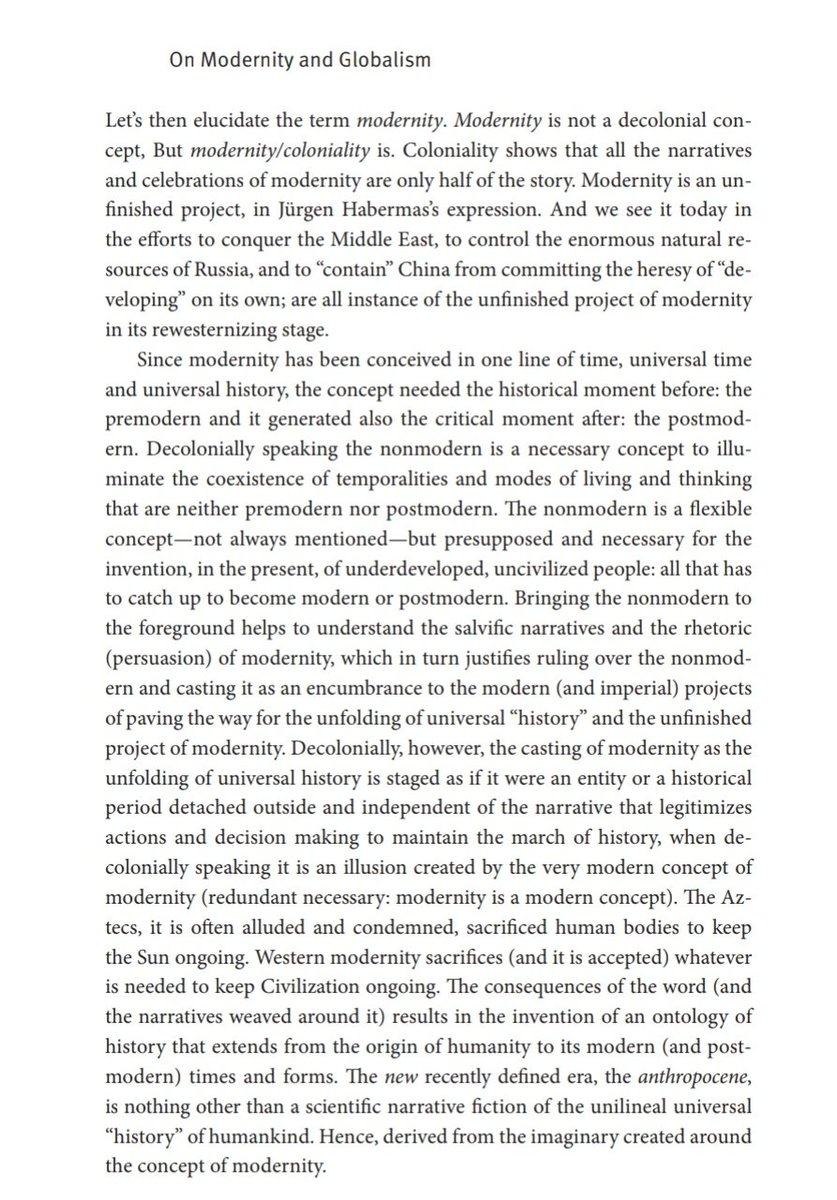

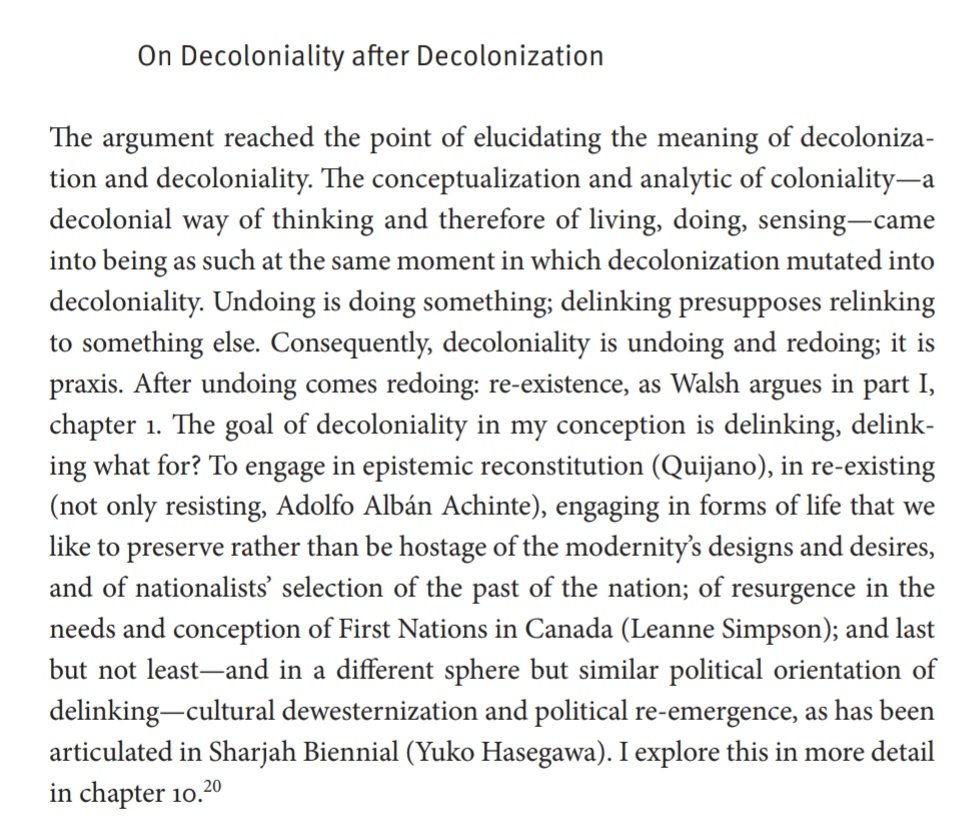
!["decoloniality focuses on changing the terms of the conversation. Dewesternization, instead, disputes the content of the conversation and leaves the terms intact. That is, it leaves intact the structure of the cmp [Colonial Matrix of Power]" "decoloniality focuses on changing the terms of the conversation. Dewesternization, instead, disputes the content of the conversation and leaves the terms intact. That is, it leaves intact the structure of the cmp [Colonial Matrix of Power]"](https://pbs.twimg.com/media/EYbIC2TWsAED3nL.jpg)
